Here are my favorite poems about outer space categorized:
- Short space poems
- Space poems that rhyme
- Poems about space and love
- Poems about the universe
- Poems about space and stars
So if you want the best poems about outer space, then you’re in the right place.
Let’s jump right into it!
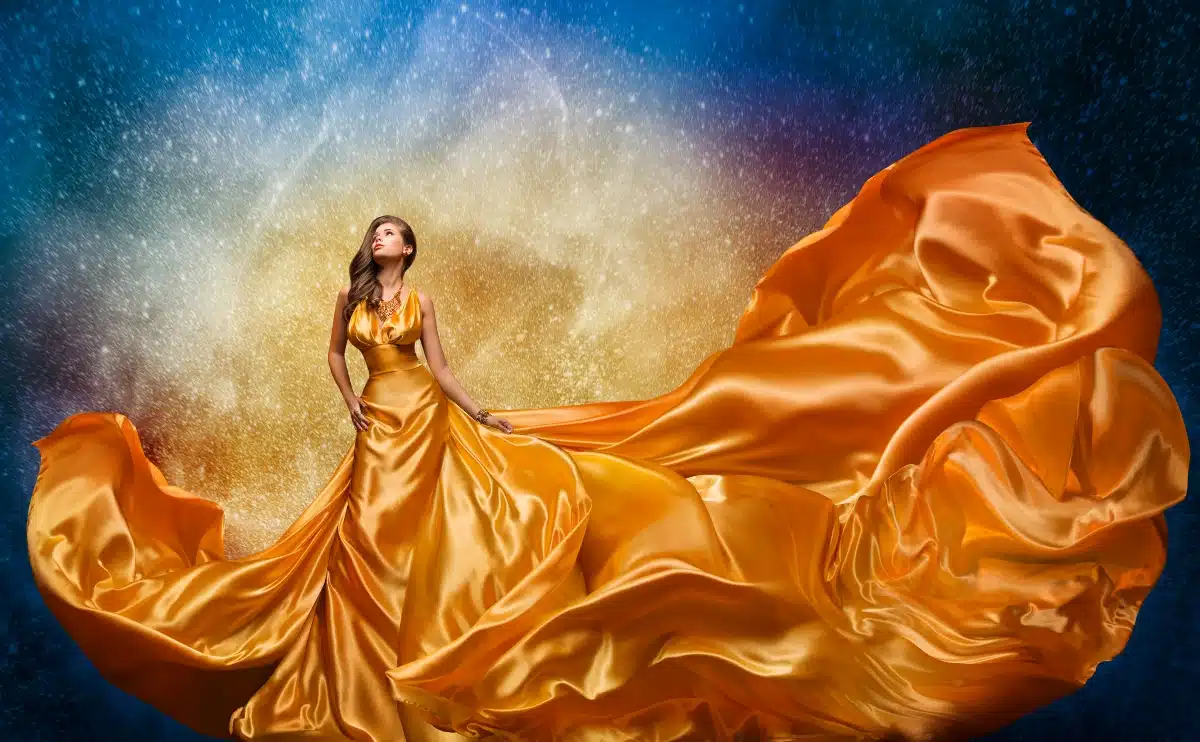
Otherworldly Poems About Outer Space
Embark on a celestial journey like no other as you explore a stellar collection of handpicked poems that delve into the vast wonders of outer space.
Experience the cosmic splendor through the captivating brevity of short space poems that encapsulate the awe-inspiring mysteries of the universe.
Traverse the cosmic expanse with verses that evoke a sense of wonder, inviting you to gaze at the stars and contemplate the infinite beauty that lies beyond our earthly realm.
Get ready to be transported to the enchanting depths of space, where each line illuminates the boundless wonders that ignite our imagination.
Let’s go!
My #1 Favorite Poem About Outer Space
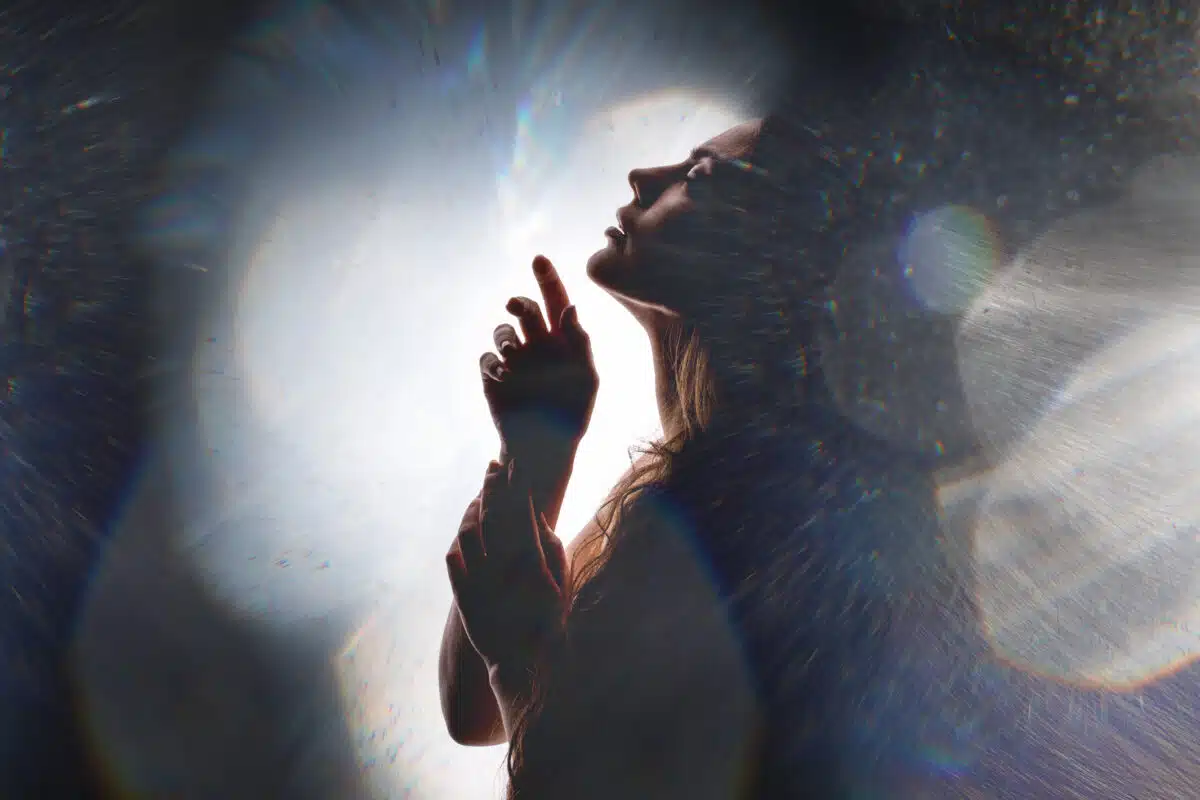
“The Quatrains of Abu’l-Ala” by Abu’l-Ala (Ameen F. Rihani, Translator)
XI
Thus they have passed , and we shall follow soon
Into an endless Midnight or a Noon ;
The Stars, that likewise oft shoot from their spheres,
Fall in the arms of wooing Sun or Moon.
Short Space Poems
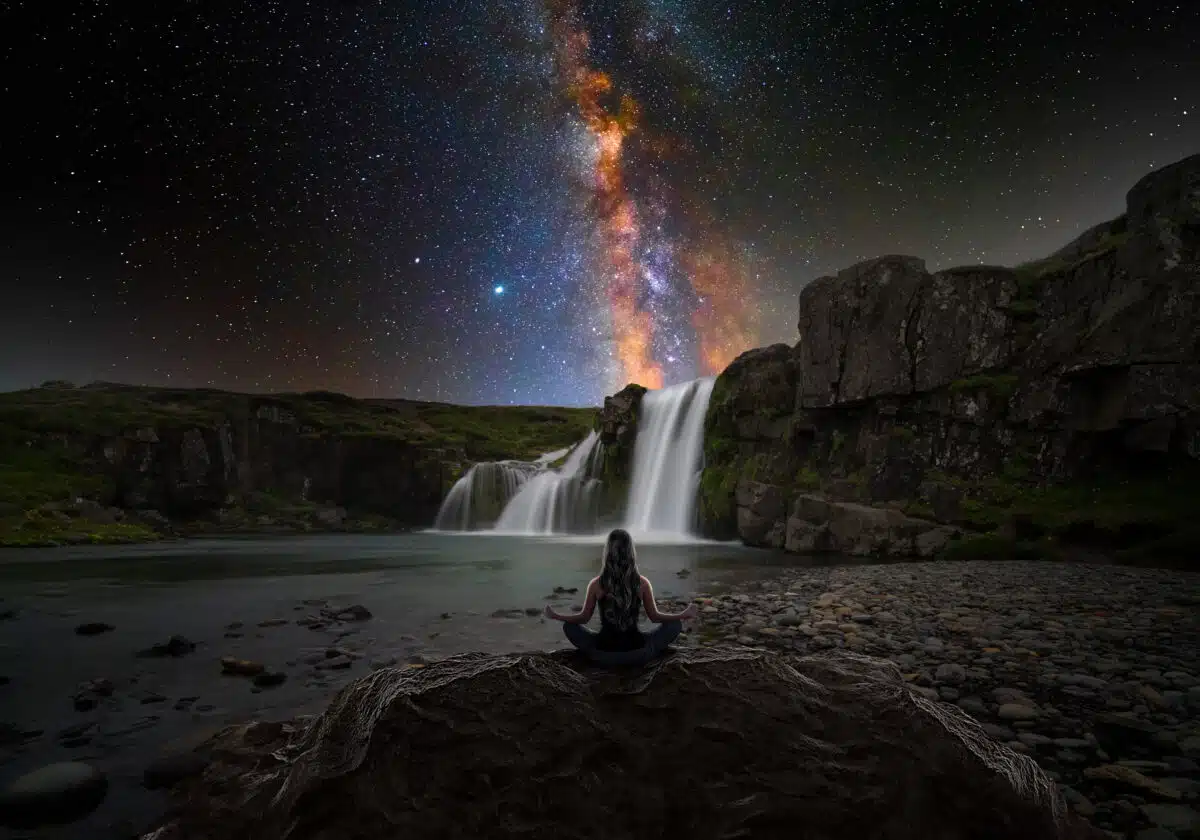
“The Galaxy” by Henry Wadsworth Longfellow
Torrent of light and river of the air,
Along whose bed the glimmering stars are seen
Like gold and silver sands in some ravine
Where mountain streams have left their channels bare!
The Spaniard sees in thee the pathway, where
His patron saint descended in the sheen
Of his celestial armor, on serene
And quiet nights, when all the heavens were fair.
Not this I see, nor yet the ancient fable
Of Phaeton’s wild course, that scorched the skies
Where’er the hoofs of his hot coursers trod;
But the white drift of worlds o’er chasms of sable,
The star-dust that is whirled aloft and flies
From the invisible chariot-wheels of God.
From “New Year’s Eve” by Edmund Ollier
A little while, and all the mirth is banish’d—
A little, little while, and all is still!
The feasters into outer space have vanish’d,
Like clouds that have departed o’er the hill.
But the clouds, before thine impulse onward springing,
In some other sky new shapings will receive;
And man’s soul, across its mortal boundaries winging,
Hails Eternity’s all-festal New Year’s Eve!
“Illumined” by Anna Hubbard Mercur
The incoming dawn met an outgoing soul,
Released from the fetters of earth-pinioned clay,
Who was seeking a pathway through space to that world
Where the inmates delight in perpetual day.
So the dawn lent her ray, which scattered the mist,
Dispersing the darkness that shadowed the way,
And the path was illumined to soul craving light,
Who will nevermore suffer from “blackest of night.”
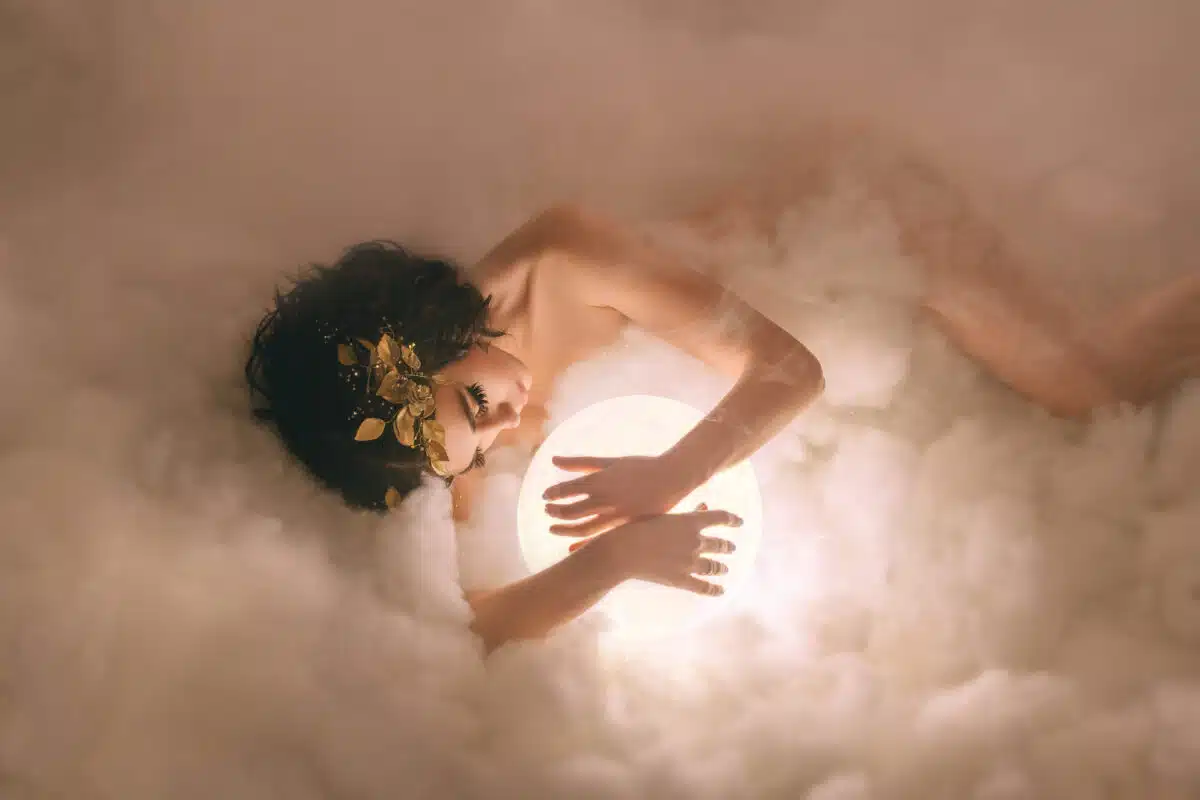
“Night” by George William Russell
Heart-hidden from the outer things I rose;
The spirit woke anew in nightly birth
Unto the vastness where forever glows
The star-soul of the earth.
There all alone in primal ecstasy,
Within her depths where revels never tire,
The Olden Beauty shines: each thought of me
Is veined through with its fire.
And all my thoughts are throngs of living souls;
They breathe in me, heart unto heart allied;
Their joy undimmed, though when the morning tolls
The planets may divide.
“Gitanjali 12” by Rabindranath Tagore
The time that my journey takes is long and the way of it long.
I came out on the chariot of the first gleam of light, and pursued my voyage through the wildernesses of worlds leaving my track on many a star and planet.
It is the most distant course that comes nearest to thyself, and that training is the most intricate which leads to the utter simplicity of a tune.
The traveller has to knock at every alien door to come to his own, and one has to wander through all the outer worlds to reach the innermost shrine at the end.
My eyes strayed far and wide before I shut them and said “Here art thou!”
The question and the cry “Oh, where?” melt into tears of a thousand streams and deluge the world with the flood of the assurance “I am!”
“The Quatrains of Abu’l-Ala” by Abu’l-Ala (Ameen F. Rihani, Translator)
CXI
Whence come, O, firmament, those myriad lights,
Whence comes thy juice, O, vine on yonder heights?
Whence comes the perfume of the rose , and whence
The Soul that with this flesh forever fights?

“To The Moon” by Percy Bysshe Shelley
I.
Art thou pale for weariness
Of climbing Heaven, and gazing on the earth,
Wandering companionless
Among the stars that have a different birth,–
And ever changing, like a joyless eye
That finds no object worth its constancy?
II.
Thou chosen sister of the spirit
That gazes on thee till in thee it pities
“Excelsior” by Ralph Waldo Emerson
Over his head were the maple buds,
And over the tree was the moon,
And over the moon were the starry studs
That drop from the angels’ shoon.
S.H.
With beams December planets dart
His cold eye truth and conduct scanned,
July was in his sunny heart,
October in his liberal hand.
“Pan” by Ralph Waldo Emerson
O what are heroes, prophets, men,
But pipes through which the breath of Pan doth blow
A momentary music. Being’s tide
Swells hitherward, and myriads of forms
Live, robed with beauty, painted by the sun;
Their dust, pervaded by the nerves of God,
Throbs with an overmastering energy
Knowing and doing. Ebbs the tide, they lie
White hollow shells upon the desert shore,
But not the less the eternal wave rolls on
To animate new millions, and exhale
Races and planets, its enchanted foam.
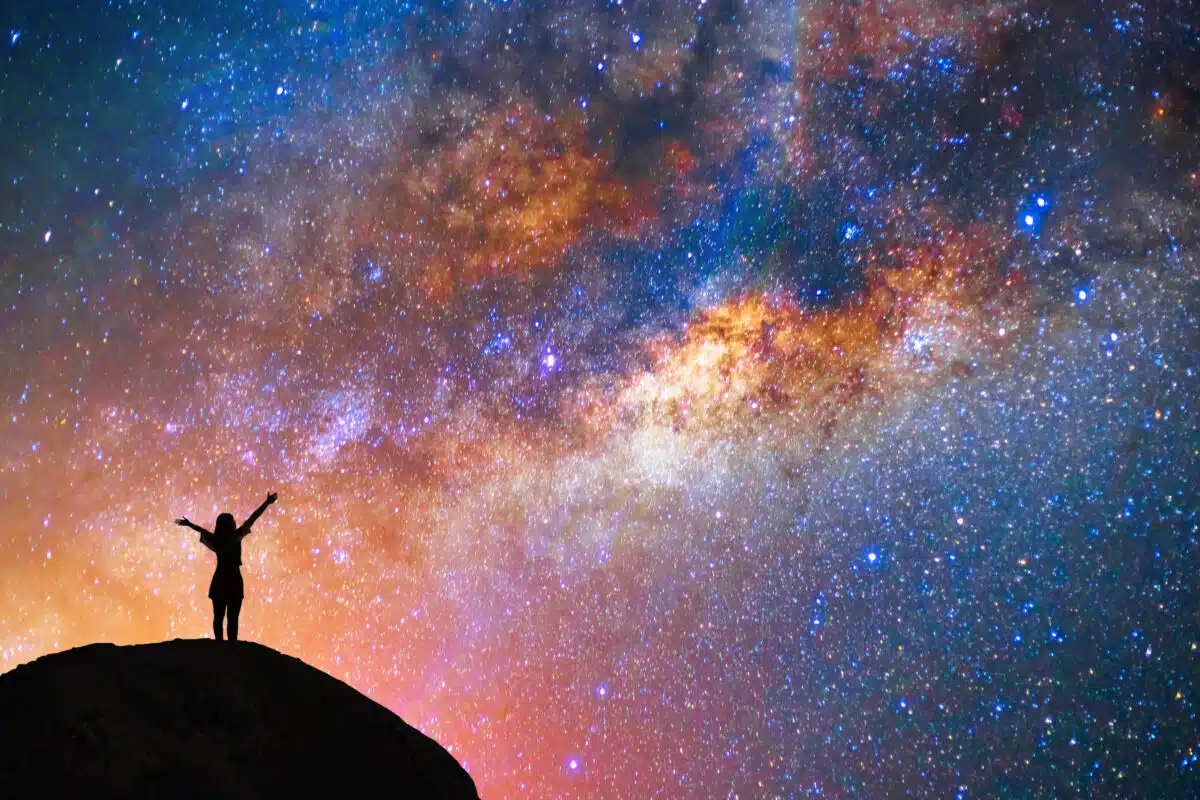
“A Starry Night” by Paul Laurence Dunbar
A cloud fell down from the heavens,
And broke on the mountain’s brow;
It scattered the dusky fragments
All over the vale below.
The moon and the stars were anxious
To know what its fate might be;
So they rushed to the azure op’ning,
And all peered down to see.
“The Ages XXXIII.” by William Cullen Bryant
Here the free spirit of mankind, at length,
Throws its last fetters off; and who shall place
A limit to the giant’s unchained strength,
Or curb his swiftness in the forward race!
Far, like the comet’s way through infinite space,
Stretches the long untravelled path of light,
Into the depths of ages : we may trace,
Distant , the brightening glory of its flight,
Till the receding rays are lost to human sight.
“Sonnet XIV” by William Shakespeare
Not from the stars do I my judgment pluck,
And yet methinks I have astronomy;
But not to tell of good or evil luck,
Of plagues, of dearths, or seasons’ quality;
Nor can I fortune to brief minutes tell,
Pointing to each his thunder, rain, and wind,
Or say with princes if it shall go well
By oft predict that I in heaven find.
But from thine eyes my knowledge I derive,
And, constant stars, in them I read such art
As truth and beauty shall together thrive
If from thyself to store thou wouldst convert:
Or else of thee this I prognosticate,
Thy end is truth’s and beauty’s doom and date.

“The Quatrains of Abu’l-Ala” by Abu’l-Ala (Ameen F. Rihani, Translator)
LXI
What! shun the Sun that guides thy battered Bark,
And seek the flash of Lightning in the Dark?
Cannot thy sins withstand his searching light?
Can not thy Soul on Heaven’s wing embark?
“The Quatrains of Abu’l-Ala” by Abu’l-Ala (Ameen F. Rihani, Translator)
V
Our Nights and Days around each other spin,
And we like Planets end as we begin;
Our feet are on the heads of those that passed,
And as the Cradle cries , the Graves all grin.
“The Quatrains of Abu’l-Ala” by Abu’l-Ala (Ameen F. Rihani, Translator)
III
Our eyes, all heedless of sweet Sleep’s behest:
Scanned in God’s book of Stars the sonnet best,
The Pleiads—ah, the Moon from them departs;
She throws a kiss and hastens toward the west.
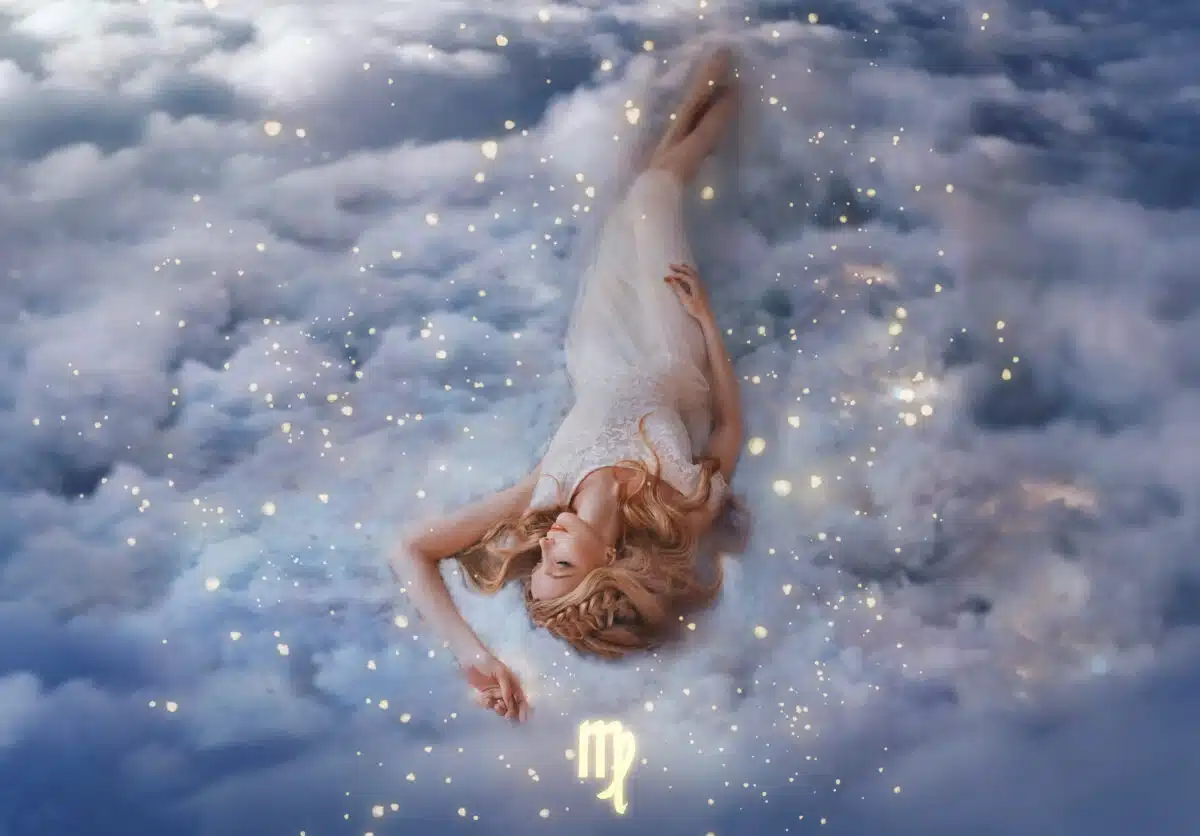
“Sonnets XXII.” by George Santayana
‘Tis love that moveth the celestial spheres
In endless yearning for the Changeless One,
And the stars sing together, as they run
To number the innumerable years.
‘Tis love that lifteth through their dewy tears
The roses’ beauty to the heedless sun,
And with no hope, nor any guerdon won,
Love leads me on, nor end of love appears.
For the same breath that did awake the flowers,
Making them happy with a joy unknown,
Kindled my light and fixed my spirit’s goal;
And the same hand that reined the flying hours
And chained the whirling earth to Phoebus’ throne,
In love’s eternal orbit keeps the soul.
“The Hours of the Evening” by Émile Verhaeren (Frank Stuart Flint, Translator)
X
When the starry sky covers our dwelling, we hush for hours before its intense and gentle fire, so that we may feel a greater and more fervent stirring within us.
The great silver stars follow their courses high up in the heavens; beneath the flames and the gleams, night spreads out its depths, and the calm is so great that the ocean listens!
But what matters even the hushing of the sea, if in the brightness and immensity of space, full of invisible violence, our hearts beat so strongly that they make all the silence?
From “Star-flowers” by Thomas Lake Harris
CXV.
The lines that weave Earth’s natural dimension,
And hold the planet for the visual ring,
May open to the luminous extension
For all in whom the Word makes bridaling;
Or gather to a close contractive cling,
For all whose instincts cleave unto the base .
Pent lives may lift for glorious blossoming;
The myriads of the just as twain embrace,
When the Great Artist draws the bow across our space.
Space Poems That Rhyme

“Song of the Stars” by William Cullen Bryant”Song of the Stars by William Cullen Bryant
When the radiant morn of creation broke,
And the world in the smile of God awoke,
And the empty realms of darkness and death
Were moved through their depths by his mighty breath
And orbs of beauty and spheres of flame
From the void abyss by myriads came, —
In the joy of youth as they darted away,
Through the widening wastes of space to play,
Their silver voices in chorus rang,
And this was the song the bright ones sang:
“Away, away, through the wide, wide sky,
The fair blue fields that before us lie,
Each sun with the worlds that round him roll,
Each planet, poised on her turning pole;
With her isles of green, and her clouds of white,
And her waters that lie like fluid light.
” For the source of glory uncovers his face,
And the brightness o’erflows unbounded space;
And we drink as we go the luminous tides
In our ruddy air and our blooming sides:
Lo , yonder the living splendours play;
Away , on our joyous path , away!
“Look, look, through our glittering ranks afar,
In the infinite azure , star after star,
How they brighten and bloom as they swiftly pass!
How the verdure runs o’er each rolling mass!
And the path of the gentle winds is seen,
Where the small waves dance, and the young woods lean
“And see where the brighter day-beams pour,
How the rainbows hang in the sunny shower;
And the morn and eve, with their pomp of hues,
Shift o’er the bright planets and shed their dews;
And ‘twixt them both , o’er the teeming ground;
With her shadowy cone the night goes round!
“Away , away! in our blossoming bowers,
In the soft air wrapping these spheres of ours,
In the seas and fountains that shine with morn,
See , Love is brooding , and Life is born,
And breathing myriads are breaking from night,
To rejoice, like us, in motion and light.
“Glide on in your beauty , ye youthful spheres ,
To weave the dance that measures the years;
Glide on , in the glory and gladness sent,
To the farthest wall of the firmament, —
The boundless visible smile of Him,
To the veil of whose brow your lamps are dim. “
“Discontent” by Ella Wheeler Wilcox
The splendid discontent of God
With chaos made the world.
Set suns in place, and filled all space
With stars that shone and whirled.
If apes had been content with tails,
No thing of higher shape
Had come to birth: the king of earth
To-day would be an ape.
And from the discontent of man
The world’s best progress springs.
Then feed the flame (from God it came),
Until you mount on wings.
“Uncontrolled” by Ella Wheeler Wilcox
The mighty forces of mysterious space
Are one by one subdued by lordly man.
The awful lightning that for eons ran
Their devastating and untrammeled race,
Now bear his messages from place to place
Like carrier doves. The winds lead on his van;
The lawless elements no longer can
Resist his strength, but yield with sullen grace.
His bold feet scaling heights before untrod,
Light, darkness, air and water, heat and cold
He bids go forth and bring him power and pelf.
And yet, though ruler, king and demi-god,
He walks with his fierce passions uncontrolled
The conqueror of all things — save himself.
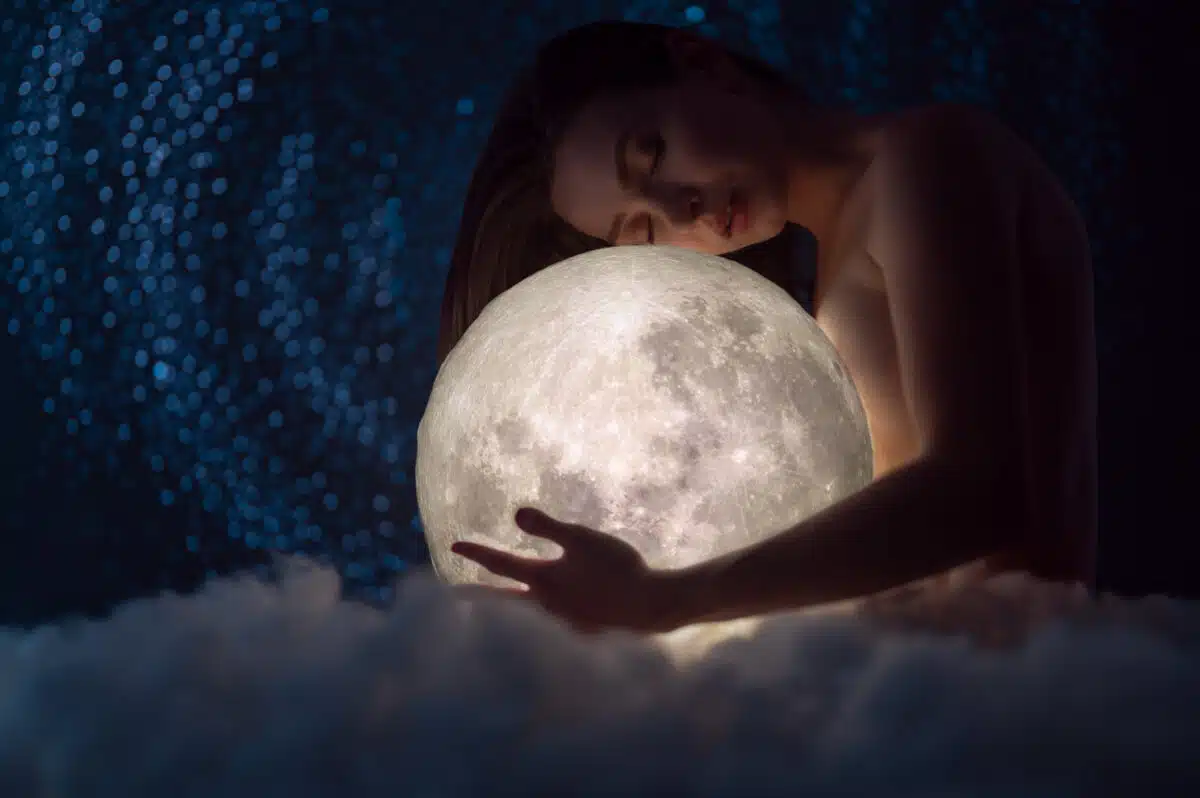
“A Serenade” by Ameen Rihani
I
The moon hath said her sad good-bye.
My sleeping queen;
And all the stars are wondering why
Thou art unseen.
Rehold! abashed, they take to flight.
As through the casement breaks thy light.
Arise, my dawn, arise!
Arise, my queen serene!
II
The field of heaven is all thine own,
My peerless star.
Just as my heart is thine alone,
Be near or far.
So let thy face adorn the night.
And flood it with thy dazzling light.
Arise, my queen, arise!
Arise, to my guitar!
Ill
The vaults above all vacant seem,
My sweetest flower;
And for thv scent, the cherubim
Long at this hour.
A moment from thy sweet dream part.
Though in that dream be wove my heart.
Arise, my queen, arise!
Let fall thy perfume shower.
“An Old Man’s Aspiration” by Thomas Hood, John Hamilton Reynolds
O glorious sun! whose car sublime
Unerring since the birth of time,
In glad magnificence hath run its race ;
O day’s delight-God-painted sky,
O moon and stars, whose galaxy
Illuminates the night thro’ all the realms of space.
O poetry of forms and hues,
Resplendent Earth ! whose varied views
In such harmonious beauty are combined ; —
And thou, O palpitating Sea,
Who holdest this fair mystery
In the wide circle of thy thrilling arms enshrined
Hear me, O hear while I impart
The deep conviction of my heart,
That such a theatre august and grand,
Whose author, actors, awful play,
Are God, mankind, a judgment day,
Was for some higher aim, some holier purpose plann’d.
I will not, nay I cannot, deem
This fair creation’s moral scheme,
That seems so crude, mysterious, misapplied,
Meant to conclude as it began,
Unworthy the material plan
With whose perfections rare its failures are allied.
As in our individual fate,
Our manhood and maturer date,
Correct the faults and follies of our youth,
So will the world, I fondly hope,
With added years give fuller scope
To the display and love of wisdom, justice, truth.
‘Tis this that makes my feelings glow,
My bosom thrill, my tears o’erflow,
At any deed magnanimous-sublime ;
‘Tis this that re-assures my soul,
When nations shun the forward goal,
And retrograde awhile in ignorance and crime.
Mine is no hopeless dream of some
Impeccable Millennium,
When saints and angels shall inhabit earth ;
But a conviction deep, intense,
That man was meant by Providence
Progressively to reach a higher moral worth.
On this dear faith’s sustaining truth
Hath my soul brooded from its youth,
As heaven’s best gift, and earth’s most cheering dower.
O! may I still in life’s decline,
Hold unimpaired this creed benign,
And mine old age attest its meliorating power!
“The Wind” by Frances Anne Butler
Night comes upon the earth; and fearfully
Arise the mighty winds, and sweep along
In the full chorus of their midnight song.
The waste of heavy clouds, that veil the sky,
Roll like a murky scroll before them driven,
And show faint glimpses of a darker heaven.
No ray is there of moon, or pale-eyed star,
Darkness is on the universe; save where
The western sky lies glimmering, faint and far,
With day’s red embers dimly glowing there.
Hark! how the wind comes gathering in its course,
And sweeping onward, with resistless force,
Howls through the silent space of starless skies,
And on the breast of the swol’n ocean dies.
Oh, though art terrible, thou viewless power!
That rid’st destroying at the midnight hour!
We hear thy mighty pinion, but the eye
Knows nothing of thine awful majesty.
We see all mute creation bow before
Thy viewless wings, as thou careerest o’er
This rocking world; that in the boundless sky
Suspended, vibrates, as thou rushest by.
There is no terror in the lightning’s glare,
That breaks its red track through the trackless air;
There is no terror in the voice that speaks
From out the clouds when the loud thunder breaks
Over the earth, like that which dwells in thee,
Thou unseen tenant of immensity.
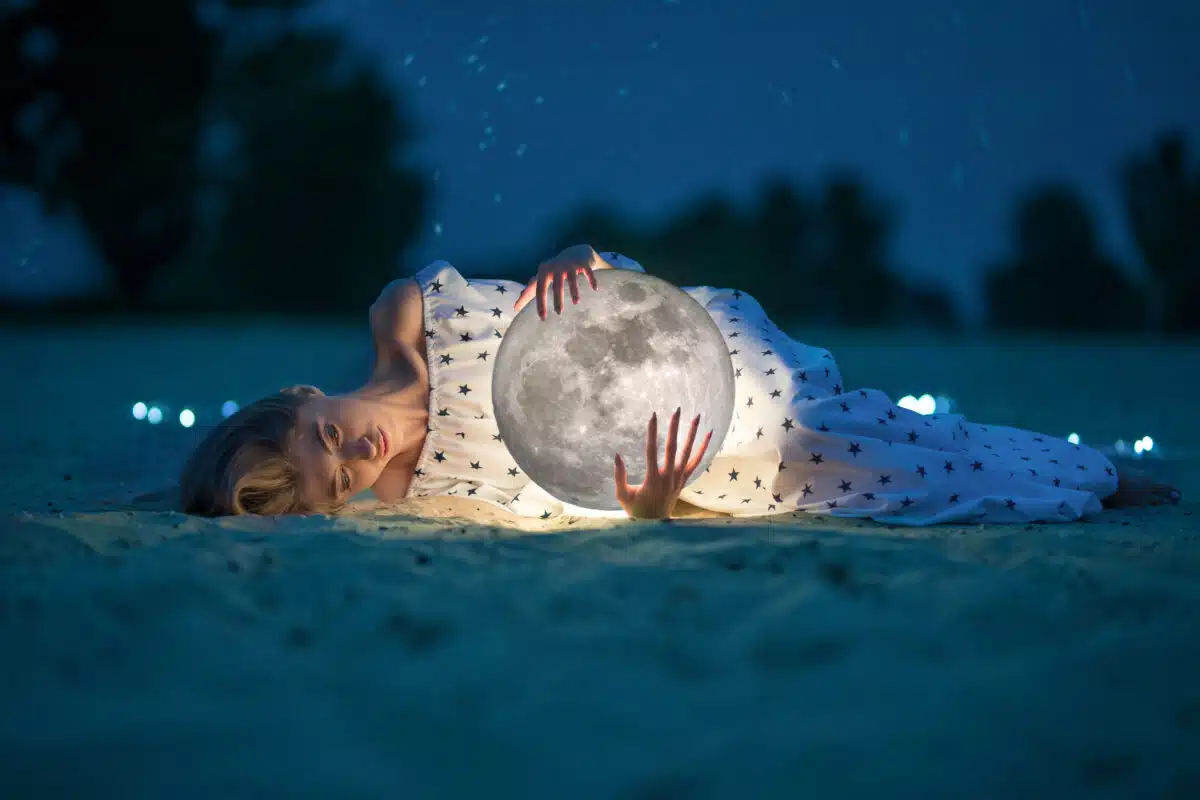
“To Abu’l-Ala” by Ameen Rihani
In thy melancholy’s pensive Fancy
Wisdom rolled its beauteous stars and moons,
Just as in my riotings of pleasure
Thy lone midnights roll into my noons.
Abu’l-Ala, in thy glorious darkness
Didst thou not remember unborn me?
In thy journey to the farthest planets
Didst thou not a burdened shadow see?
Ay, behind the portals of Saturnus
Secretly the cup to thee I passed;
Long, long after this cup thou returnest
Filled with gems of fancy and recast.
In thy Prison a thousand Yamen weapons
Thou didst forge for the oppressed and weak:
In my attic a thousand Beauty roses
I pluck for thee from a Yankee cheek.
“Earth Evanescent” by Maxwell Anderson
If other planets dark as earth
About dim trembling stars
Carry frail freight of death and birth,
Wild love, and endless wars;
If from far, unseen motes in flight
Life look down questioning
This helpless passage through the night
Is a less lonely thing:
But if unchained through empty space
Drift only shell and fire
What seeks the beauty of this face,
What end has its desire?
A candle in a night of storms,
Blown back and choked with rain,
Holds longer than the mounting forms
That ride time’s hurricane.
“On Death” by Percy Bysshe Shelley
I.
The pale, the cold, and the moony smile
Which the meteor beam of a starless night
Sheds on a lonely and sea-girt isle ,
Ere the dawning of morn’s undoubted light ,
Is the flame of Life so fickle and wan
That fits round our steps till their strength is gone .
II.
O man! hold thee on in courage of soul
Through the stormy shades of thy worldly way,
And the billows of cloud that around thee roll
Shall sleep in the light of a wondrous day ,
Where Hell and Heaven shall leave thee free
To the universe of Destiny .
III.
This world is the nurse of all we know,
This world is the mother of all we feel,
And the coming of death is a fearful blow
To a brain unencompassed with nerves of steel;
When all that we know, or feel, or see ,
Shall pass like an unreal mystery.
IV.
The secret things of the grave are there,
Where all but this frame must surely be;
Though the fine – wrought eye and the wondrous ear
No longer will live to hear or to see
All that is great and all that is strange
In the boundless realm of unending change.
V.
Who telleth a tale of unspeaking death?
Who lifteth the veil of what is to come?
Who painteth the shadows that are beneath
The wide-winding caves of the peopled tomb?
Or uniteth the hopes of what shall be
With the fears and the love for that which we see?

“My Religion” by George McClellan Bilger
I know not where or when or how
God called the universe from space ;.
Or set in force these laws that now
Hurl suns and stars in endless race.
I can not fathom His great plan,
Nor trace creation’s farther shore ;
And e’en the origin of man
Remains as hidden as before.
“Each cradle asks” from “whence” we came,-
“Each coffin, whither” goest thou?
And yet, to me, they still remain
Unchallenged and unanswered now.
And yet I know, He who did’st call
My soul from out the realms of night;
And who dost mark the sparrow^’s fall,
My earthly course will guide aright.
When threat ‘ning dangers dark appall,
And woes engulf me as the tide;
Some hand, unseen, averts the fall.
And turns the impending blow aside.
And so my trust, at first but weak.
Through years of guidance hath grown strong;
And through the devious ways I keep
Hath sheltered me from wrong.
And ye, who think I little show
The outward signs of piety,
But little reck’ the joy I know
In feeling that He guideth me.
And so, through earth’s dark vale I tread,
And know no dread nor fear;
Conscious some Power, from o’er head,
Is ever present here.
“Hymn of Pan” by Percy Bysshe Shelley
I.
The sleepless Hours who watch me as I lie,
From the broad moonlight of the sky,
Fanning the busy dreams from my dim eyes,
Waken me when their Mother , the grey Dawn,
Tells them that dreams and that the moon is gone.
II.
Then I arise , and climbing Heaven’s blue dome,
I walk over the mountains and the waves,
Leaving my robe upon the ocean foam;
My footsteps pave the clouds with fire; the caves
Are filled with my bright presence , and the air
Leaves the green earth to my embraces bare.
III.
The sunbeams are my shafts, with which I kill
Deceit , that loves the night and fears the day;
All men who do or even imagine ill
Fly me , and from the glory of my ray
Good minds and open actions take new might,
Until diminished by the reign of night.
IV.
I feed the clouds , the rainbows and the flowers
With their ætherial colours; the Moon’s globe
And the pure stars in their eternal bowers
Are cinctured with my power as with a robe;
Whatever lamps on Earth or Heaven may shine,
Are portions of one power, which is mine.
V.
I stand at noon upon the peak of Heaven ,
Then with unwilling steps I wander down
Into the clouds of the Atlantic even;
For grief that I depart they weep and frown:
What look is more delightful than the smile
With which I soothe them from the western isle?
VI.
I am the eye with which the Universe
Beholds itself and knows it is divine;
All harmony of instrument or verse,
All prophecy , all medicine is mine,
All light of art or nature ; —to my song,
Victory and praise in its own right belong.
“The Skies” By William Cullen Bryant
Ay! gloriously thou standest there,
Beautiful, boundless firmament!
That swelling wide o’er earth and air,
And round the horizon bent,
With thy bright vault, and sapphire wall,
Dost overhang and circle all.
Far, far below thee, tall old trees
Arise, and piles built up of old,
And hills, whose ancient summits freeze,
In the fierce light and cold.
The eagle soars his utmost height,
Yet far thou stretchest o’er his flight.
Thou hast thy frowns—with thee on high,
The storm has made his airy seat,
Beyond that soft blue curtain lie
His stores of hail and sleet.
Thence the consuming lightnings break.
There the strong hurricanes awake.
Yet art thou prodigal of smiles—
Smiles, sweeter than thy frowns are stem:
Earth sends, from all her thousand isles,
A shout at thy return.
The glory that comes down from thee,
Bathes, in deep joy, the land and sea.
The sun, the gorgeous sun, is thine,
The pomp that brings and shuts the day,
The clouds that round him change and shine,
The airs that fan his way.
Thence look the thoughtful stars, and there
The meek moon walks the silent air.
The sunny Italy may boast
The beauteous tints that flush her skies.
And lovely, round the Grecian coast,
May thy blue pillars rise.
I only know how fair they stand,
Around my own beloved land.
And they are fair—a charm is theirs,
That earth, the proud green earth, has not—
With all the forms, and hues, and airs,
That haunt her sweetest spot.
We gaze upon thy calm pure sphere,
And read of Heaven’s eternal year.
Oh, when, amid the throng of men,
The heart grows sick of hollow mirth,
How willingly we turn us then
Away from this cold earth,
And look into thy azure breast,
For seats of innocence and rest!
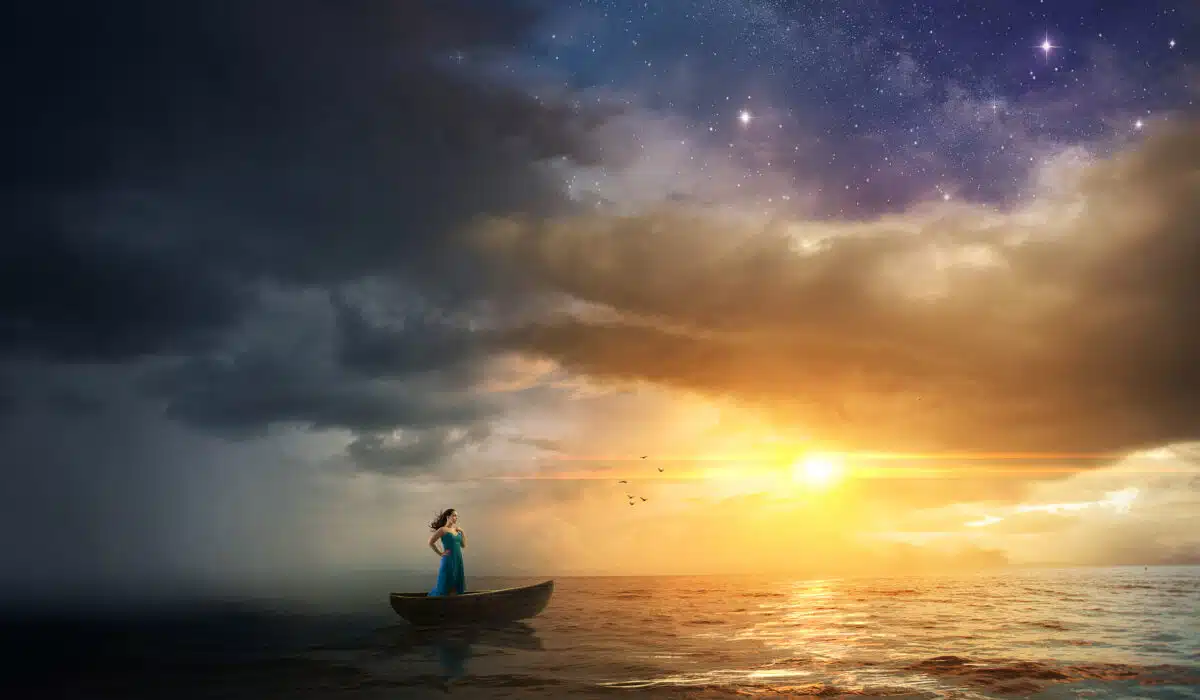
“Between Two Rains” by Nora May French
It is a silver space between two rains;
The lulling storm has given to the day
An hour of windless air and riven grey;
The world is drained of color; light remains.
Beyond the curving shore a gull complains;
Unceasing, on the bastions of the bay,
With gleam of shields and veer of vaporing spray
The long seas fall, the grey tide wars and wanes.
It is a silver space between two rains:
A mood too sweet for tears, for joy too pale—
What stress has swept or nears us, thou and I?
This hour a mist of light is on the plains,
And seaward fares again with litten sail
Our laden ship of dreams adown the sky.
“The Spiritual Dawn” by Charles Baudelaire (W. J. Robertson, Translator)
When on some wallowing soul the roseate East
Dawns with the Ideal that awakes and gnaws,
By vengeful working of mysterious laws
An angel rises in the drowsed beast.
The inaccessible blue of the soul-sphere
To him whose grovelling dream remorse doth gall
Yawns wide as when the gulfs of space enthral.
So, heavenly Goddess, Spirit pure and clear,
Even on the reeking ruins of vile shame
Thy rosy vision, beautiful and bright,
For ever floats on my enlargëd sight.
Thus sunlight blackens the pale taper-flame;
And thus is thy victorious phantom one,
O soul of splendour, with the immortal Sun!
“A Landscape” by Charles Baudelaire (F. P. Sturm, Translator)
I would, when I compose my solemn verse,
Sleep near the heaven as do astrologers,
Near the high bells, and with a dreaming mind
Hear their calm hymns blown to me on the wind.
Out of my tower, with chin upon my hands,
I’ll watch the singing, babbling human bands;
And see clock-towers like spars against the sky,
And heavens that bring thoughts of eternity;
And softly, through the mist, will watch the birth
Of stars in heaven and lamplight on the earth;
The threads of smoke that rise above the town;
The moon that pours her pale enchantment down.
Seasons will pass till Autumn fades the rose;
And when comes Winter with his weary snows,
I’ll shut the doors and window-casements tight,
And build my faery palace in the night.
Then I will dream of blue horizons deep;
Of gardens where the marble fountains weep;
Of kisses, and of ever-singing birds—
A sinless Idyll built of innocent words.
And Trouble, knocking at my window-pane
And at my closet door, shall knock in vain;
I will not heed him with his stealthy tread,
Nor from my reverie uplift my head;
For I will plunge deep in the pleasure still
Of summoning the spring-time with my will,
Drawing the sun out of my heart, and there
With burning thoughts making a summer air.
Poems About Space and Love
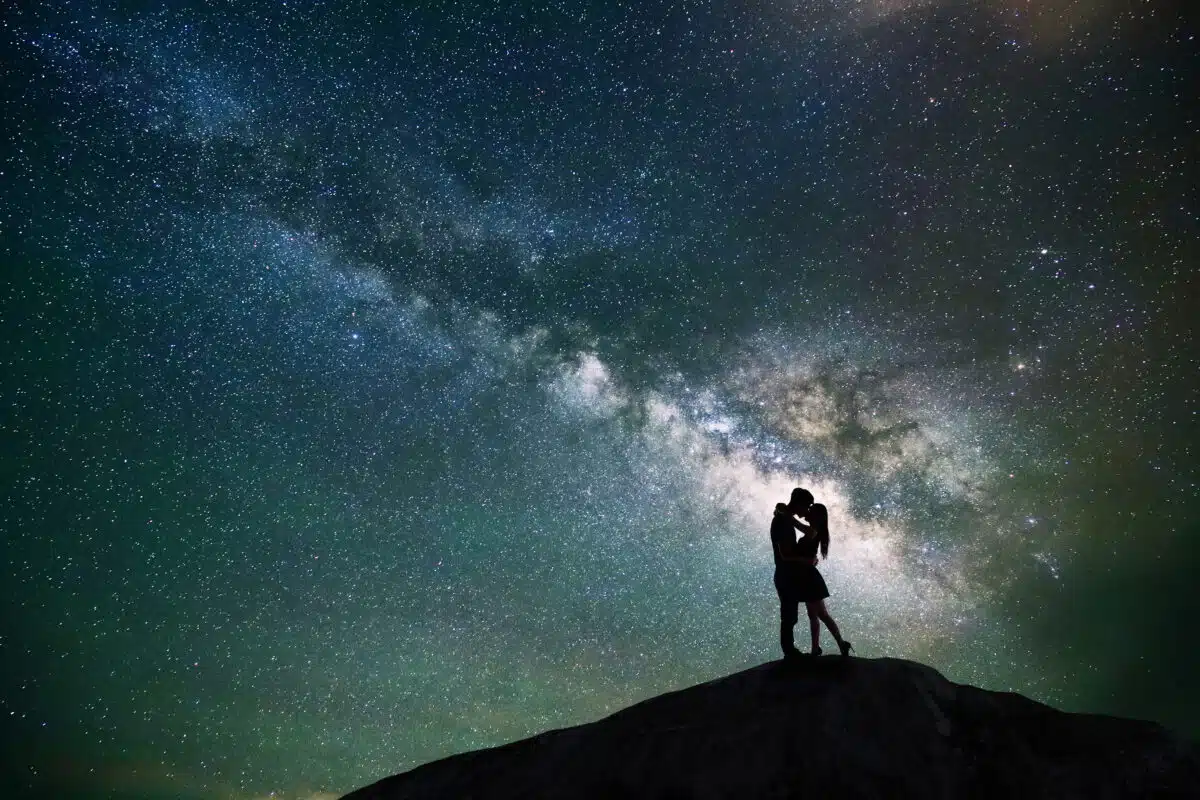
“Cosmos” by Ralph Waldo Emerson
Who saw the hid beginnings
When Chaos and Order strove,
Or who can date the morning.
The purple flaming of love?
I saw the hid beginnings
When Chaos and Order strove,
And I can date the morning prime
And purple flame of love.
Song breathed from all the forest,
The total air was fame;
It seemed the world was all torches
That suddenly caught the flame.
Is there never a retroscope mirror
In the realms and corners of space
That can give us a glimpse of the battle
And the soldiers face to face?
Sit here on the basalt courses
Where twisted hills betray
The seat of the world-old Forces
Who wrestled here on a day.
When the purple flame shoots up,
And Love ascends his throne,
I cannot hear your songs, O birds,
For the witchery of my own.
And every human heart
Still keeps that golden day
And rings the bells of jubilee
On its own First of May.
“Love Is All!” by Ella Wheeler Wilcox
Let Labor boldly walk abroad
And take its place with kings,
For who has labored more than God,
The maker of all things?
The time has come, aye, even now it is,
To rank that parable in Genesis
Of God’s great curse of labor placed on man,
With other fairy tales. Why, He began
All work Himself! He was so full of force
He flung the solar systems on their course
And builded worlds on worlds; and, not content,
He labors still: when mighty suns are spent,
He forges on His white-hot anvil —space—
New stars to tell His glory and His grace.
Who most achieves is most like God, I hold;
The idler is the black sheep in the fold.
Not for the hardened toiler with the hoe
My tears of sorrow and compassion flow.
Though he be dull, unlettered and not fair
To look upon ; tho’ he is bowed with care,
Yet in his heart if dear love fold its wings,
He stands a monarch over unloved kings.
One sorrow only in God’s world has birth —
To live unloving and unloved on earth;
One joy alone makes life a part of heaven —
The joy of happy love, received and given.
Down through the chaos of our human laws
Love shines supreme, the great Eternal Cause.
God loved so much His thoughts burst into flame,
And from that sacred source Creation came.
The heart which feels this holy light within
Finds God and man and beast and bird its kin.
All class distinctions fade and disappear.
Death is new life, and heaven he sees a-near.
Brother is he to “ox” and “seraphim,”
“Slave to the wheel,” mayhap, yet kings to him,
And millionaires, seem paupers, if from them
Life has withheld its luminous great gem.
Or if his badge be sceptre, hoe or hod,
That man is king who knows that love is God.
“Avila” by George Santayana
Again my feet are on the fragrant moor
Amid the purple uplands of Castile,
Realm proudly desolate and nobly poor,
Scorched by the sky’s inexorable zeal.
Wide desert where a diadem of towers
Above Adaja hems a silent town,
And locks, unmindful of the mocking hours,
Her twenty temples in a granite crown.
The shafts of fervid light are in the sky,
And in my heart the mysteries of yore.
Here the sad trophies of my spirit lie:
These dead fulfilled my destiny before.
Like huge primeval stones that strew this plain,
Their nameless sorrows sink upon my breast,
And like this ardent sky their cancelled pain
Smiles at my grief and quiets my unrest.
For here hath mortal life from age to age
Endured the silent hand that makes and mars,
And, sighing, taken up its heritage
Beneath the smiling and inhuman stars.
Still o’er this town the crested castle stands,
A nest for storks, as once for haughty souls,
Still from the abbey, where the vale expands,
The curfew for the long departed tolls,
Wafting some ghostly blessing to the heart
From prayer of nun or silent Capuchin,
To heal with balm of Golgotha the smart
Of weary labour and distracted sin.
What fate has cast me on a tide of time
Careless of joy and covetous of gold,
What force compelled to weave the pensive rhyme
When loves are mean, and faith and honour old,
When riches crown in vain men’s sordid lives,
And learning chokes a mind of base degree?
What winged spirit rises from their hives?
What heart, revolting, ventures to be free?
Their pride will sink and more ignobly fade
Without memorial of its hectic fire.
What altars shall survive them, where they prayed?
What lovely deities? What riven lyre?
Tarry not, pilgrim, but with inward gaze
Pass daily, musing, where their prisons are,
And o’er the ocean of their babble raise
Thy voice in greeting to thy changeless star.
Abroad a tumult, and a ruin here;
Nor world nor desert hath a home for thee.
Out of the sorrows of the barren year
Build thou thy dwelling in eternity.
Let patience, faith’s wise sister, be thy heaven,
And with high thoughts necessity alloy.
Love is enough, and love is ever given,
While fleeting days bring gift of fleeting joy.
The little pleasures that to catch the sun
Bubble a moment up from being’s deep,
The glittering sands of passion as they run,
The merry laughter and the happy sleep,—
These are the gems that, like the stars on fire,
Encrust with glory all our heaven’s zones;
Each shining atom, in itself entire,
Brightens the galaxy of sister stones,
Dust of a world that crumbled when God’s dream
To throbbing pulses broke the life of things,
And mingled with the void the scattered gleam
Of many orbs that move in many rings,
Perchance at last into the parent sun
To fall again and reunite their rays,
When God awakes and gathers into one
The light of all his loves and all his days.
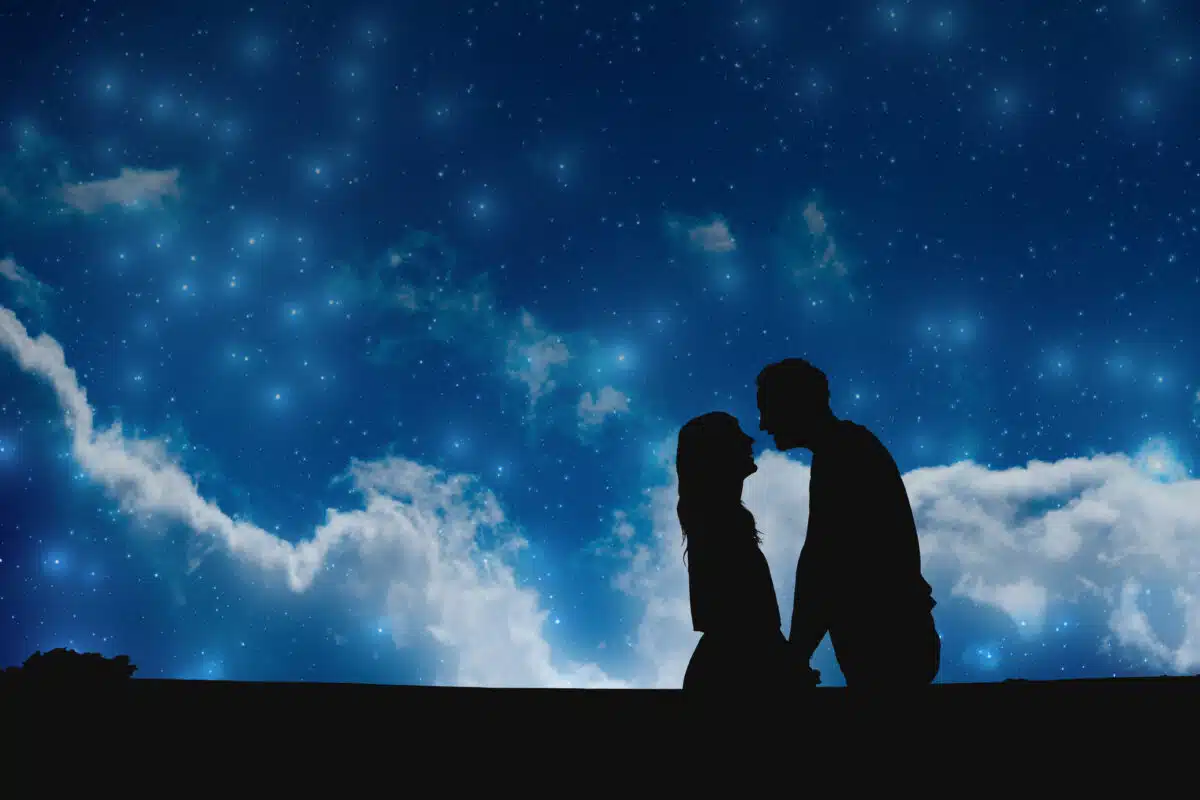
“Night of Love” by Paul Laurence Dunbar
The moon has left the sky, love,
The stars are hiding now,
And frowning on the world, love,
Night bares her sable brow.
The snow is on the ground, love,
And cold and keen the air is.
I’m singing here to you, love;
You’re dreaming there in Paris.
But this is Nature’s law, love,
Though just it may not seem,
That men should wake to sing, love;
While maidens sleep and dream.
Them care may not molest, love,
Nor stir them from their slumbers,
Though midnight find the swain, love.
Still halting o’er his numbers.
I watch the rosy dawn, love,
Come stealing up the east,
While all things round rejoice, love,
That Night her reign has ceased.
The lark will soon be heard, love,
And on his way be winging;
When Nature’s poets wake, love,
Why should a man be singing?
“In Empty Courts” by Nora May French
His love is warm and constant as the sun,
Like sunlight in the outer spaces spent,
In empty courts where tumbling fountains run,
And flowers bloom, and he is well content.
To you my heart must turn for all its light—
Alas, the grudging taper that you give!
So small to make the inner temple bright,
So dim to give the glow by which I live.
He is the sun, for all the world to mark,
So warm and fair he shines! nor understands
That I must still be crouching in the dark,
Shielding a little flame with loving hands.
“Dawn” by George William Russell
Still as the holy of holies breathes the vast
Within its crystal depths the stars grow dim;
Fire on the altar of the hills at last
Burns on the shadowy rim.
Moments that holds all moments; white upon
The verge it trembles; then like mists of flowers
Break from the fairy fountain of the dawn
The hues of many hours.
Thrown downward from that high companionship
Of dreaming inmost heart with inmost heart,
Into the common daily ways I slip,
My fire from theirs apart.

“The Dawn of Darkness” by George William Russell
Come earth’s little children pit-pat from their burrows on the hill;
Hangs within the gloom its weary head the shining daffodil.
In the valley underneath us through the fragrance flit along
Over fields and over hedgerows little quivering drops of song.
All adown the pale blue mantle of the mountains far away
Stream the tresses of the twilight flying in the wake of day.
Night comes; soon alone shall fancy follow sadly in her flight
Where the fiery dust of evening, shaken from the feet of light,
Thrusts its monstrous barriers between the pure, the good, the true,
That our weeping eyes may strain for, but shall never after view.
Only yester eve I watched with heart at rest the nebulæ
Looming far within the shadowy shining of the Milky Way;
Finding in the stillness joy and hope for all the sons of men;
Now what silent anguish fills a night more beautiful than then.
For earth’s age of pain has come, and all her sister planets weep,
Thinking of her fires of morning passing into dreamless sleep.
In this cycle of great sorrow for the moments that we last
We too shall be linked by weeping to the greatness of her past:
But the coming race shall know not, and the fount of tears shall dry,
And the arid heart of man be arid as the desert sky.
So within my mind the darkness dawned and round me everywhere
Hope departed with the twilight, leaving only dumb despair.
“There Will Be Stars” by Sara Teasdale
There will be stars over the place forever;
Though the house we loved and the street we loved are lost,
Every time the earth circles her orbit
On the night the autumn equinox is crossed,
Two stars we knew, poised on the peak of midnight
Will reach their zenith; stillness will be deep;
There will be stars over the place forever,
There will be stars forever, while we sleep.
“Gli occhi miei vaghi delle cose belle” by Michael Angelo (George Santayana, Translator)
Ravished by all that to the eyes is fair,
Yet hungry for the joys that truly bless,
My soul can find no stair
To mount to heaven, save earth’s loveliness.
For from the stars above
Descends a glorious light
That lifts our longing to their highest height
And bears the name of love.
Nor is there aught can move
A gentle heart, or purge or make it wise,
But beauty and the starlight of her eyes.
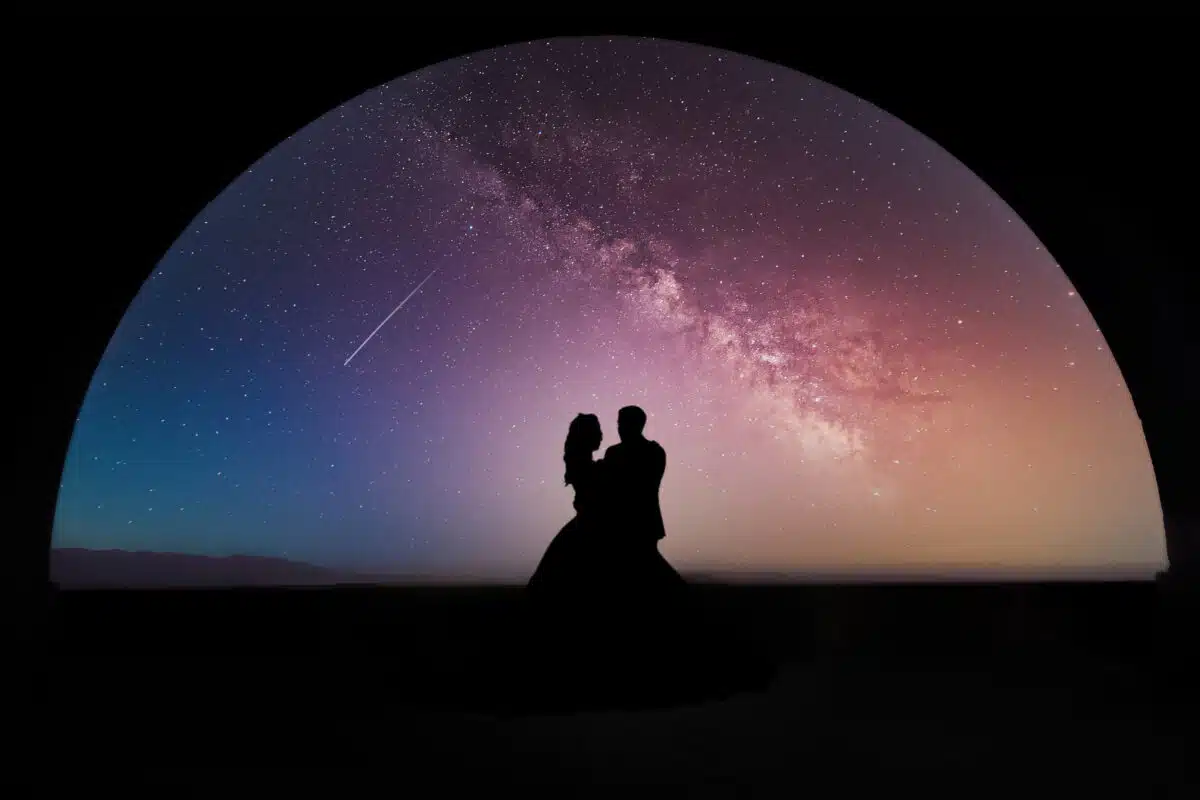
“The Hours of the Afternoon” by Émile Verhaeren (Frank Stuart Flint, Translator)
XI
Dawn, darkness, evening, space and the stars; that which the night conceals or shows between its veils is mingled with the fervour of our exalted being. Those who live with love live with eternity.
It matters not that their reason approve or scoff, and, upright on its high walls, hold out to them, along the quays and harbours, its bright torches; they are the travellers from beyond the sea.
Far off, farther than the ocean and its black floods, they watch the day break from shore to shore; fixed certainty and trembling hope present the same front to their ardent gaze.
Happy and serene, they believe eagerly; their soul is the deep and sudden brightness with which they burn the summit of the loftiest problems; and to know the world, they but scrutinize themselves.
They follow distant roads chosen by themselves, living with the truths enclosed within their simple, naked eyes, that are deep and gentle as the dawn; and for them alone there is still song in paradise.
Poems About the Universe
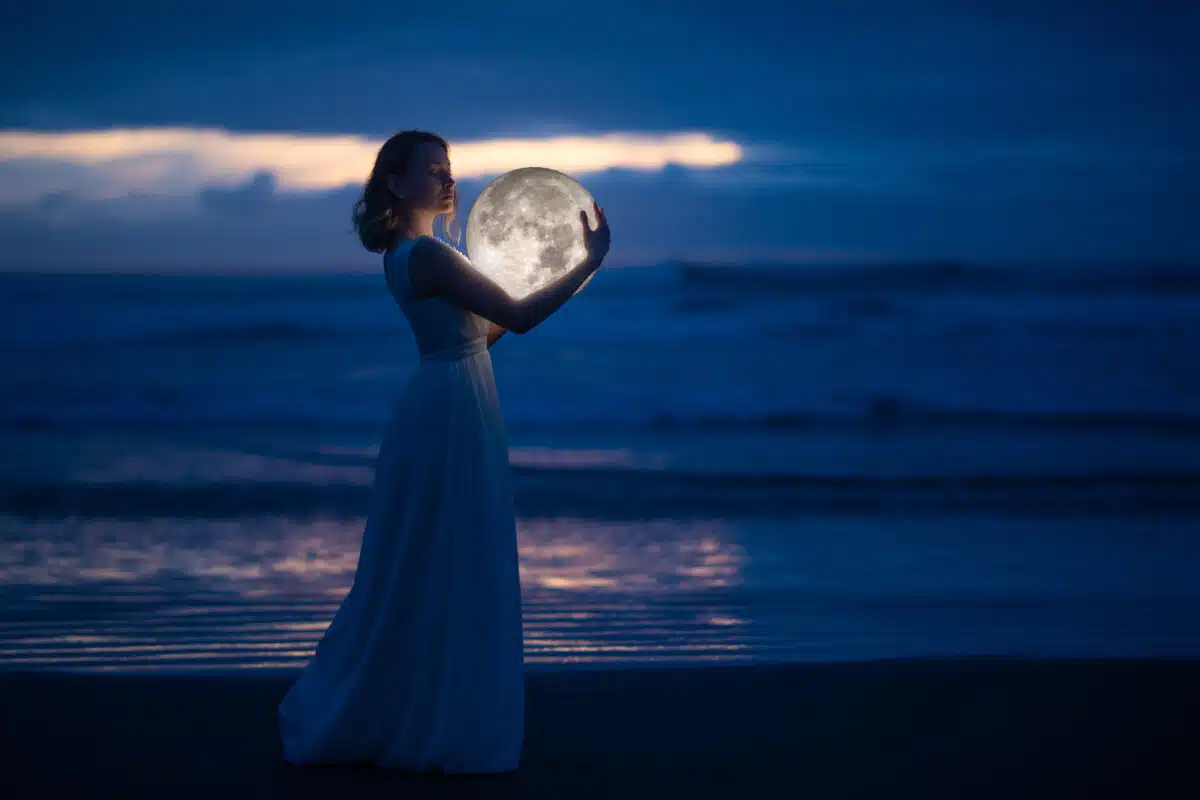
From “Prologue to Hellas” by Percy Bysshe Shelley
The curtain of the Universe
Is rent and shattered,
The splendour-winged worlds disperse
Like wild doves scattered.
Space is roofless and bare,
And in the midst a cloudy shrine,
Dark amid thrones of light.
In the blue glow of hyaline
Golden worlds revolve and shine .
In flight
From every point of the Infinite,
Like a thousand dawns on a single night
The splendours rise and spread;
And through thunder and darkness dread
Light and music are radiated,
And in their pavilioned chariots led
By living wings high overhead
The giant Powers move,
Gloomy or bright as the thrones they fill.
“The Moon” by Emily Dickinson
The moon was but a chin of gold
A night or two ago,
And now she turns her perfect face
Upon the world below.
Her forehead is of amplest blond;
Her cheek like beryl stone;
Her eye unto the summer dew
The likest I have known.
Her lips of amber never part;
But what must be the smile
Upon her friend she could bestow
Were such her silver will!
And what a privilege to be
But the remotest star!
For certainly her way might pass
Beside your twinkling door.
Her bonnet is the firmament,
The universe her shoe,
The stars the trinkets at her belt,
Her dimities of blue.
“The Stars” by Madison Julius Cawein
These—the bright symbols of man’s hope and fame,
In which he reads his blessing or his curse—
Are syllables with which God speaks His name
In the vast utterance of the universe.
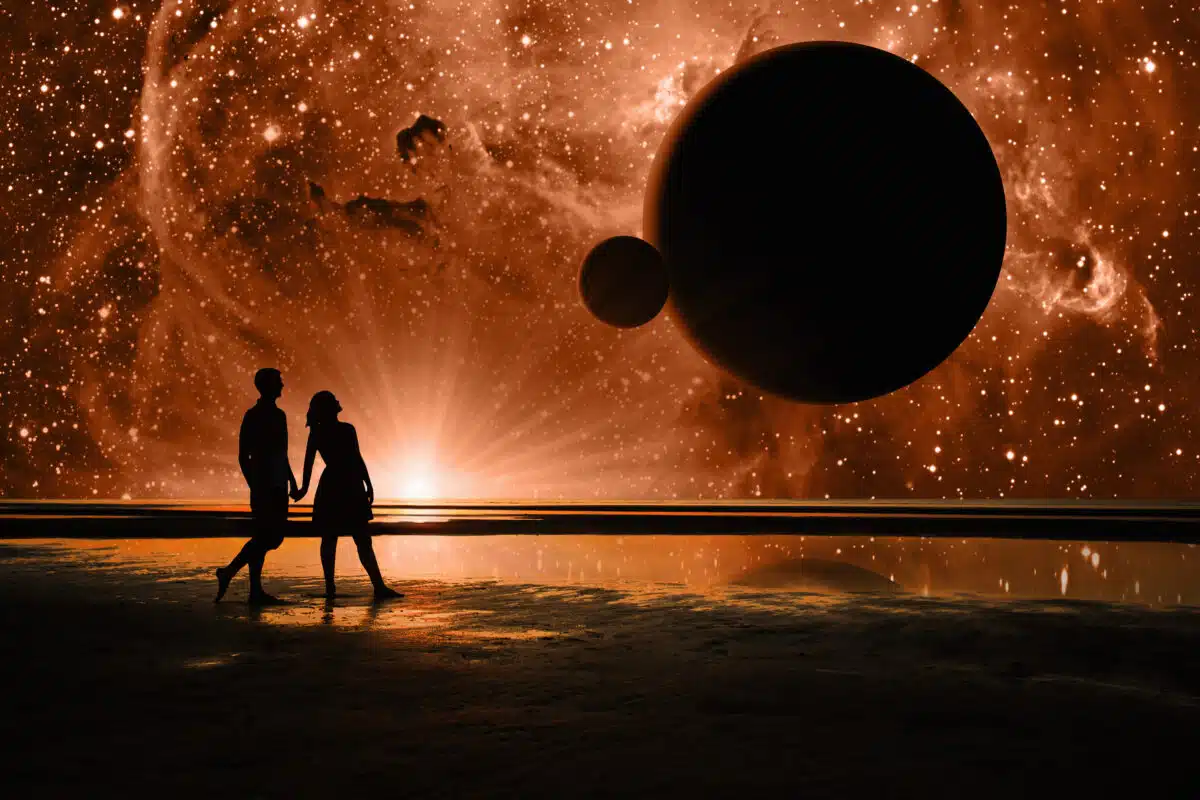
From “The Cosmos” by Herbert Goodell
The glow was bright, intense, and clear, yet deep;
And beauty brooded o’er the universe,
Her garlands fresh, her gems like gleams of light.
The earth was grand! Long ages had flown since
With giant force from central orb she sprung
And, set among the stars, went wheeling on
In space, circling around the parent mass.
The frosts of time hung like a coronal
Upon her mountain brow more regal than
In summer days and as enduring as
The granite base just peeping from below.
The air was floating round , an azure robe,
Soft as the zephyr, and as graceful as
The bridal veil; then all the plain was still;
The ocean slumbered; deep in silence hushed
The earthquake lay, no sound of discord here,
And no disturbing voice to break the spell.
In quiet nature breathed and this is peace!
“Aspiration” by Anna Hubbard Mercur
In God’s extended universe my place
Is fixed. ‘Tis not by human gauge or rule
Defined, nor is it stationary school
Wherein I learn my winding way to trace,
Sustained and guided by omniscient grace.
I would be, Lord, like unto polished tool,
Clear cut, reflecting light divine. A fool
If need be fear I not to seem, our race
So fallen , unto Thee again to turn.
For this my soul as smoldering flame doth burn .
O omnipresent, uncreated God,
Lift me, I pray, as by divining rod,
To higher heights, where, nearer unto Thee,
My will in unison with thine shall be!
“Lines Written at Night” by Frances Anne Butler
Oh, thou surpassing beauty! that dost live
Shrined in yon silent stream of glorious light!
Spirit of harmony! that through the vast
And cloud-embroidered canopy art spreading
Thy wings, that o’er our shadowy earth hang brooding,
Like a pale silver haze, betwixt the moon
And the world’s darker orb: beautiful, hail!
Hail to thee! from her midnight throne of ether,
Night looks upon the slumbering universe.
There is no breeze on silver-crownëd tree,
There is no breath on dew-bespangled flower,
There is no wind sighs on the sleepy wave,
There is no sound hangs in the solemn air.
All, all are silent, all are dreaming, all,
Save those eternal eyes, that now shine forth
Winking the slumberer’s destinies. The moon
Sails on the horizon’s verge, a moving glory,
Pure, and unrivalled; for no paler orb
Approaches, to invade the sea of light
That lives around her; save yon little star,
That sparkles on her robe of fleecy clouds,
Like a bright gem, fallen from her radiant brow.
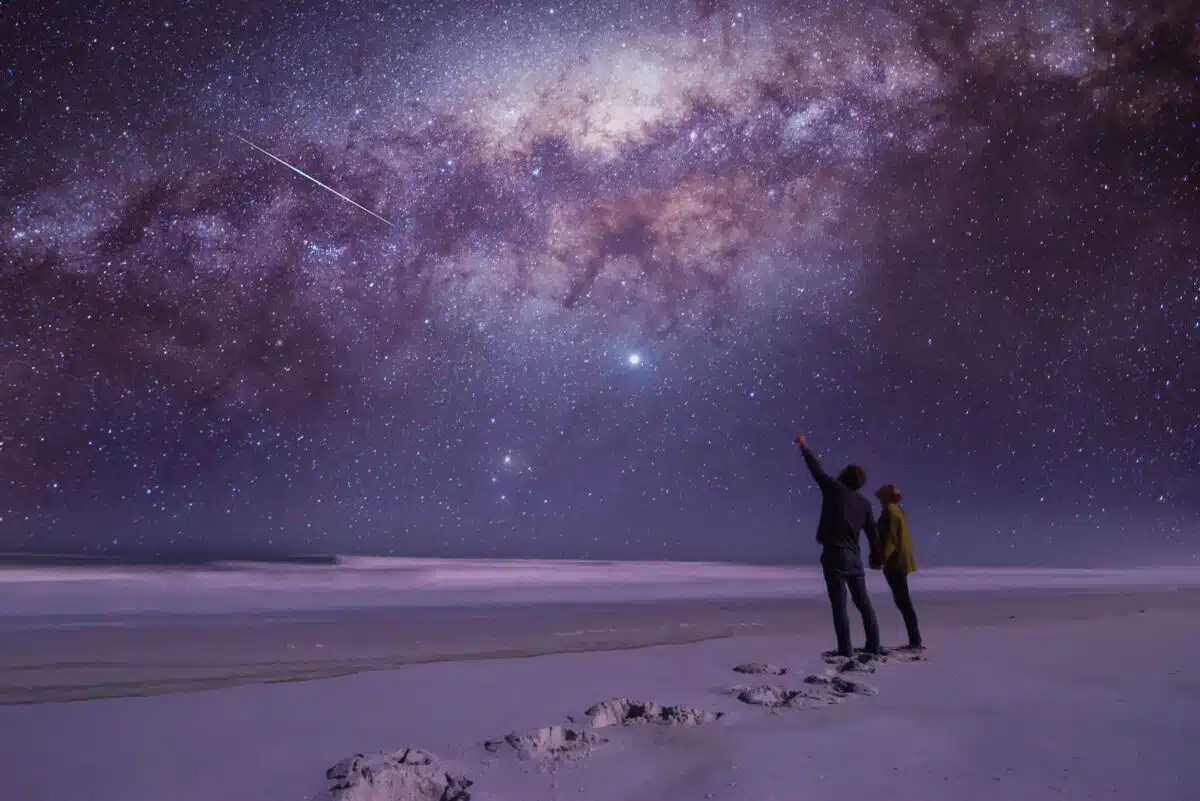
“The Song of a Comet” by Clark Ashton Smith
A plummet of the changing universe,
Far-cast, I flare
Through gulfs the sun’s uncharted orbits bind,
And spaces bare
That intermediate darks immerse
By road of sun nor world confined.
Upon my star-undominated gyre
I mark the systems vanish one by one;
Among the swarming worlds I lunge,
And sudden plunge
Close to the zones of solar fire;
Or ‘mid the mighty wrack of stars undone,
Flash, and with momentary rays
Compel the dark to yield
Their aimless forms, whose once far-potent blaze
In ashes chill is now inurned.
A space revealed,
I see their planets turned,
Where holders of the heritage of breath
Exultant rose, and sank to barren death
Beneath the stars’ unheeding eyes.
Adown contiguous skies
I pass the thickening brume
Of systems yet unshaped, that hang immense
Along mysterious shores of gloom;
Or see—unimplicated in their doom—
The final and disastrous gyre
Of blinded suns that meet,
And from their mingled heat,
And battle-clouds intense,
O’erspread the deep with fire.
Through stellar labyrinths I thrid
Mine orbit placed amid
The multiple and irised stars, or hid,
Unsolved and intricate,
In many a planet-swinging sun’s estate.
Ofttimes I steal in solitary flight
Along the rim of the exterior night
That grips the universe;
And then return,
Past outer footholds of sidereal light,
To where the systems gather and disperse;
And dip again into the web of things,
To watch it shift and burn,
Hearted with stars. On peaceless wings
I pierce, where deep-outstripping all surmise,
The nether heavens drop unsunned,
By stars and planets shunned.
And then I rise
Through vaulting gloom, to watch the dark
Snatch at the flame of failing suns;
Or mark
The heavy-dusked and silent skies,
Strewn thick with wrecked and broken stars,
Where many a fated orbit runs.
An arrow sped from some eternal bow,
Through change of firmaments and systems sent,
And finding bourn nor bars,
I flee, nor know
For what eternal mark my flight is meant.
“Chant to Sirius” by Clark Ashton Smith
What nights retard thee, O Sirius!
Thy light is as a spear,
And thou penetratest them
As a warrior that stabbeth his foe
Even to the center of his life.
Thy rays reach farther than the gulfs;
They form a bridge thereover,
That shall endure till the links of the universe
Are unfastened, and drop apart,
And all the gulfs are one,
Dissevered by suns no longer.
How strong art thou in thy place!
Thou stridest thine orbit,
And the darkness shakes beneath thee,
As a road that is trodden by an army.
Thou art a god,
In thy temple that is hollowed with light
In the night of infinitude,
And whose floor is the lower void;
Thy worlds are as priests and ministers therein.
Thou furrowest space,
Even as an husbandman,
And sowest it with alien seed;
It beareth alien fruits,
And these are thy testimony,
Even as the crops of his fields
Are the testimony of an husbandman.
“Cupido” by Ralph Waldo Emerson
The solid, solid universe
Is pervious to Love;
With bandaged eyes he never errs,
Around, below, above.
His blinding light
He flingeth white
On God’s and Satan’s brood,
And reconciles
By mystic wiles
The evil and the good.

From “Epipsychidion” by Percy Bysshe Shelley
Sweet Benediction in the eternal Curse!
Veiled Glory of this lampless Universe!
Thou Moon beyond the clouds! Thou living Form
Among the Dead! Thou Star above the Storm:
Thou Wonder , and thou Beauty , and thou Terror!
Thou Harmony of Nature’s art! Thou Mirror
In whom , as in the splendour of the Sun,
All shapes look glorious which thou gazest on!
Ay, even the dim words which obscure thee now
Flash, lightning-like , with unaccustomed glow;
I pray thee that thou blot from this sad song
All of its much mortality and wrong,
With those clear drops , which start like sacred dew
From the twin lights thy sweet soul darkens through,
Weeping , till sorrow becomes ecstasy:
Then smile on it, so that it may not die.
From “Adonais” by Percy Bysshe Shelley
LIV.
That Light whose smile kindles the Universe,
That Beauty in which all things work and move,
That Benediction which the eclipsing Curse
Of birth can quench not , that sustaining Love
Which through the web of being , blindly wove
By man and beast and earth and air and sea,
Burns bright or dim , as each are mirrors of
The fire for which all thirst, —now beams on me,
Consuming the last clouds of cold mortality.
LV .
The breath whose might I have invoked in song
Descends on me; my spirit’s bark is driven,
Far from the shore , far from the trembling throng
Whose sails were never to the tempest given;
The massy earth and sphered skies are riven!
I am borne darkly, fearfully afar;
Whilst , burning through the inmost veil of Heaven ,
The soul of Adonais, like a star,
Beacons from the abode where the Eternal are.
“Space and dread and the dark” by William Ernest Henley
Space and dread and the dark—
Over a livid stretch of sky
Cloud-monsters crawling, like a funeral train
Of huge, primeval presences
Stooping beneath the weight
Of some enormous, rudimentary grief;
While in the haunting loneliness
The far sea waits and wanders with a sound
As of the trailing skirts of Destiny,
Passing unseen
To some immitigable end
With her grey henchman, Death.
What larve, what spectre is this
Thrilling the wilderness to life
As with the bodily shape of Fear?
What but a desperate sense,
A strong foreboding of those dim
Interminable continents, forlorn
And many-silenced, in a dusk
Inviolable utterly, and dead
As the poor dead it huddles and swarms and styes
In hugger-mugger through eternity?
Life—life—let there be life!
Better a thousand times the roaring hours
When wave and wind,
Like the Arch-Murderer in flight
From the Avenger at his heel,
Storm through the desolate fastnesses
And wild waste places of the world!
Life—give me life until the end,
That at the very top of being,
The battle-spirit shouting in my blood,
Out of the reddest hell of the fight
I may be snatched and flung
Into the everlasting lull,
The immortal, incommunicable dream.
Poems About Space and Stars
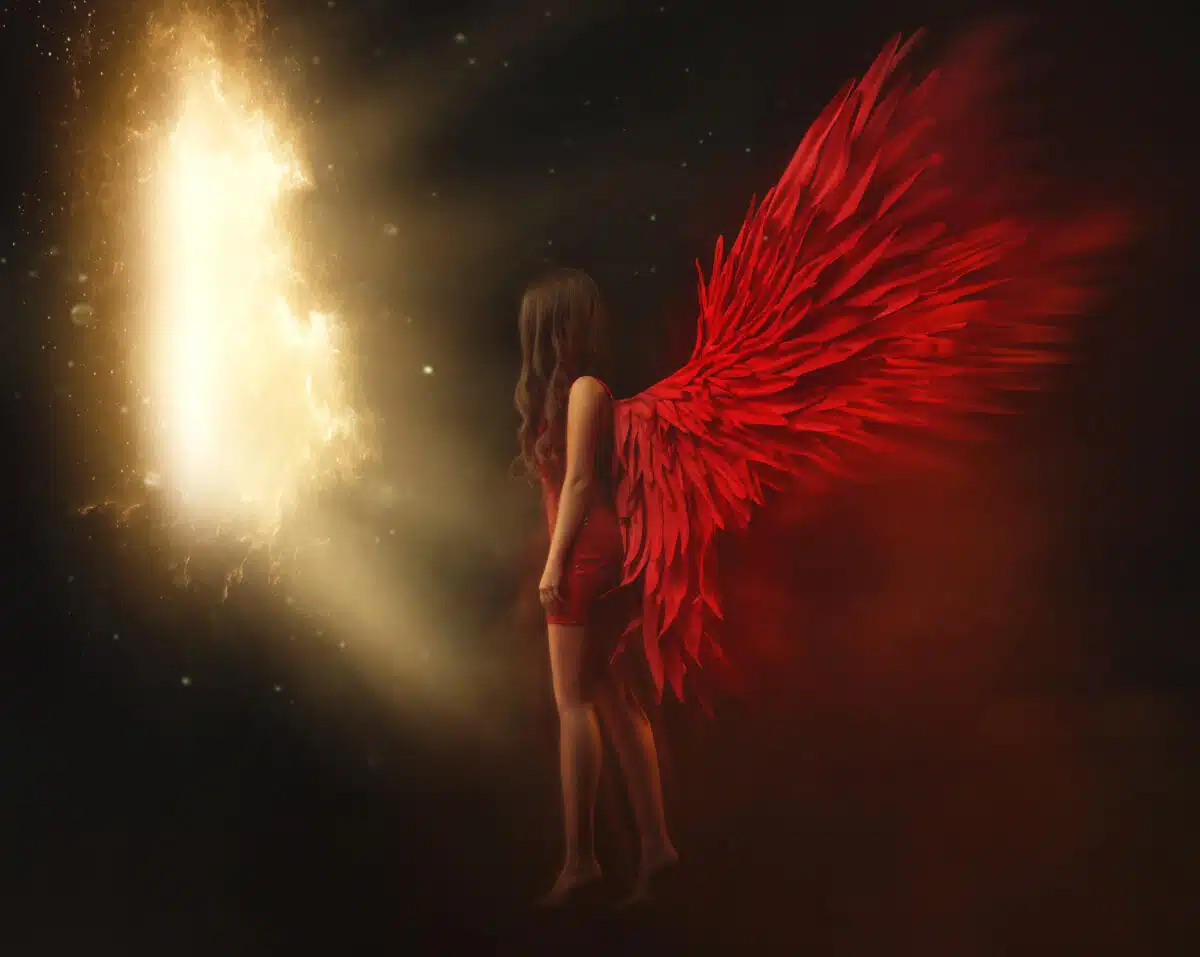
‘The Treasure” by Robinson Jeffers
Mountains, a moment’s earth-waves rising and hollowing; the earth too’s an ephemerid; the stars—
Short-lived as grass the stars quicken in the nebula and dry in their summer, they spiral
Blind up space, scattered black seeds of a future; nothing lives long, the whole sky’s
Recurrences tick the seconds of the hours of the ages of the gulf before birth, and the gulf
After death is like dated: to labor eighty years in a notch of eternity is nothing too tiresome,
Enormous repose after, enormous repose before, the flash of activity.
Surely you never have dreamed the incredible depths were prologue and epilogue merely
To the surface play in the sun, the instant of life, what is called life? I fancy
That silence is the thing, this noise a found word for it; interjection, a jump of the breath at that silence;
Stars burn, grass grows, men breathe: as a man finding treasure says ‘Ah!’ but the treasure’s the essence;
Before the man spoke it was there, and after he has spoken he gathers it, inexhaustible treasure.
“Stars” by Robert Frost
How countlessly they congregate
O’er our tumultuous snow,
Which flows in shapes as tall as trees
When wintry winds do blow!—
As if with keenness for our fate,
Out faltering few steps on
To white rest, and a place of rest
Invisible at dawn,—
And yet with neither love nor hate,
Those stars like some snow-white
Minerva’s snow-white marble eyes
Without the gift of sight.
From “The Star-Treader” by Clark Ashton Smith
A voice cried to me in a dawn of dreams,
Saying, “Make haste: the webs of death and birth
Are brushed away, and all the threads of earth
Wear to the breaking; spaceward gleams
Thine ancient pathway of the suns,
Whose flame is part of thee;
And deeps outreach immutably
Whose largeness runs
Through all thy spirit’s mystery.
Go forth, and tread unharmed the blaze
Of stars where through thou camest in old days;
Pierce without fear each vast
Whose hugeness crushed thee not within the past.
A hand strikes off the chains of Time,
A hand swings back the door of years;
Now fall earth’s bonds of gladness and of tears,
And opens the strait dream to space sublime.”
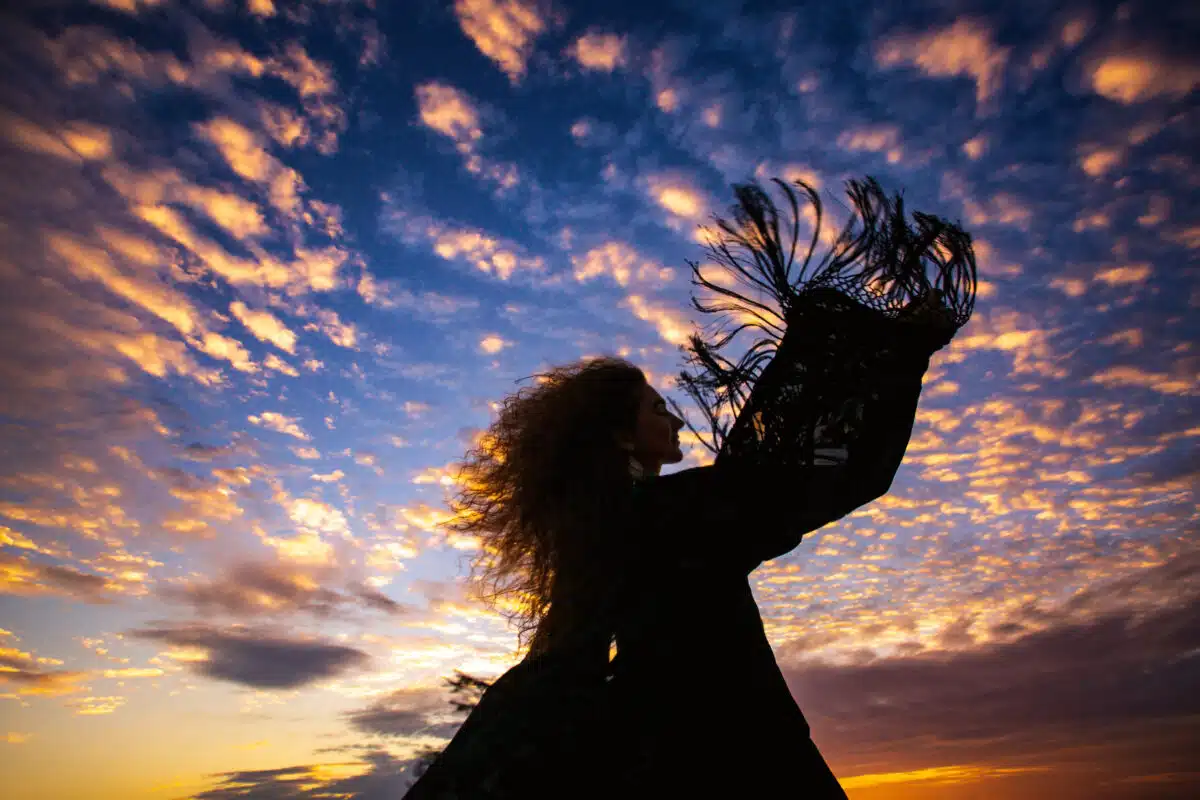
“Finis” by Clark Ashton Smith
It seemed that from the west
The live red flame of sunset,
Eating the dead blue sky
And cold insensate peaks,
Was loosened slowly, and fell.
Above it, a few red stars
Burned down like low candle-flames
Into the gaunt black sockets
Of the chill insensible mountains.
But in the ascendant skies
(Cloudless, like some vast corpse
Unfeatured, cerementless)
Succeeded nor star nor planet.
It may have been that black,
Pulseless, dead stars arose
And crossed as of old the heavens.
But came no living orb,
Nor comet seeming the ghost,
Homeless, of an outcast world,
Seeking its former place
That is no more nor shall be
In all the Cosmos again.
Null, blank, and meaningless
As a burnt scroll that blackens
With the passing of the fire,
Lay the dead infinite sky.[100]
Lo! in the halls of Time,
I thought, the torches are out—
The revelry of the gods,
Or lamentation of demons
For which their flames were lit,
Over and quiet at last
With the closing peace of night,
Whose dumb, dead, passionless skies
Enfold the living world
As the sea a sinking pebble.
“The Return of Hyperion” by Clark Ashton Smith
The dungeon-clefts of Tartarus
Are just beyond yon mountain-girdle,
Whose mass is bound around the bulk
Of the dark, unstirred, unmoving East.
Alike on the mountains and the plain,
The night is as some terrific dream,
That closes the soul in a crypt of dread
Apart from touch or sense of earth,
As in the space of Eternity.
What light unseen perturbs the darkness?
Behold! it stirs and fluctuates
Between the mountains and the stars
That are set as guards above the prison
Of the captive Titan-god. I know
That in the deeps beneath, Hyperion
Divides the pillared vault of dark,
And stands a space upon its ruin.
Then light is laid upon the peaks,
As the hand of one who climbs beyond;
And, lo! the Sun! The sentinel stars
Are dead with overpotent flame,
And in their place Hyperion stands.
The night is loosened from the land,
As a dream from the mind of the dreamer.
A great wind blows across the dawn,
Like the wind of the motion of the world.
“The Star” by Isaac Rieman Baxley
Because my seas are wide, and I
Whirl through a Planet-painted sky,
Because I dare to come and go
Through endlessness, and overflow
Of passion’s still unfigured glow;
Because the eyes of men shall be
But where I take them carefully ,
The fate of men be fixed , and cast
Wherever path of mine is passed ,
All-helpless tenants of my day
Fade as my figure shrinks away;
Because I dance , and swim , and be
What all men cling to passionately
Upbraiding in their jealousy;
Because I bind them in my keep,
And hear them wail, and see them weep,
And still with heartless vigor run
My race immortal with the Sun,
What challenger shall rise and say
The Earth is fretful on her way?
I laugh when comes the little cry
Of trouble-mad mortality:
What! shall I bear thee, and invest
My body for thy joy and zest;
My beauty braid, and lips declare
For thee the lullabies of air;
My potions mix, for thee distil
Elixirs the starred spaces fill;
Shall I with tireless footsteps turn
Round the vast plains where planets burn,
Draw past the brilliant gazing globes
Of intense Suns my clouds and robes;
Sustain thee when the unknown gales
Drive into Heavenly climes and vales
Shall I do this, and then dare be
Rebellious to my Sovereignty?
Go then; forsake my wayward will;
If thou’rt a conqueror, go—fulfil
In some far Planet’s starry eyes
The madness of thy destinies.

“The Stars In Their Courses” by John Frederick Freeman
And now, while the dark vast earth shakes and rocks
In this wild dream-like snare of mortal shocks,
How look (I muse) those cold and solitary stars
On these magnificent, cruel wars?–
Venus, that brushes with her shining lips
(Surely!) the wakeful edge of the world and mocks
With hers its all ungentle wantonness?–
Or the large moon (pricked by the spars of ships
Creeping and creeping in their restlessness),
The moon pouring strange light on things more strange,
Looks she unheedfully on seas and lands
Trembling with change and fear of counterchange?
O, not earth trembles, but the stars, the stars!
The sky is shaken and the cool air is quivering.
I cannot look up to the crowded height
And see the fair stars trembling in their light,
For thinking of the starlike spirits of men
Crowding the earth and with great passion quivering:–
Stars quenched in anger and hate, stars sick with pity.
I cannot look up to the naked skies
Because a sorrow on dark midnight lies,
Death, on the living world of sense;
Because on my own land a shadow lies
That may not rise;
Because from bare grey hillside and rich city
Streams of uncomprehending sadness pour,
Thwarting the eager spirit’s pure intelligence …
How look (I muse) those cold and solitary stars
On these magnificent, cruel wars?
Stars trembled in broad heaven, faint with pity.
An hour to dawn I looked. Beside the trees
Wet mist shaped other trees that branching rose,
Covering the woods and putting out the stars.
There was no murmur on the seas,
No wind blew–only the wandering air that grows
With dawn, then murmurs, sighs,
And dies.
The mist climbed slowly, putting out the stars,
And the earth trembled when the stars were gone;
And moving strangely everywhere upon
The trembling earth, thickened the watery mist.
And for a time the holy things are veiled.
England’s wise thoughts are swords; her quiet hours
Are trodden underfoot like wayside flowers,
And every English heart is England’s wholly.
In starless night
A serious passion streams the heaven with light.
A common beating is in the air–
The heart of England throbbing everywhere.
And all her roads are nerves of noble thought,
And all her people’s brain is but her brain;
And all her history, less her shame,
Is part of her requickened consciousness.
Her courage rises clean again.
Even in victory there hides defeat;
The spirit’s murdered though the body survives,
Except the cause for which, a people strives
Burn with no covetous, foul heat.
Fights she against herself who infamously draws
The sword against man’s secret spiritual laws.
But thou, England, because a bitter heel
Hath sought to bruise the brain, the sensitive will,
The conscience of the world,
For this, England, art risen, and shalt fight
Purely through long profoundest night,
Making their quarrel thine who are grieved like thee;
And (if to thee the stars yield victory)
Tempering their hate of the great foe that hurled
Vainly her strength against the conscience of the world.
I looked again, or dreamed I looked, and saw
The stars again and all their peace again.
The moving mist had gone, and shining still
The moon went high and pale above the hill.
Not now those lights were trembling in the vast
Ways of the nervy heaven, nor trembled earth:
Profound and calm they gazed as the soft-shod hours passed.
And with less fear (not with less awe,
Remembering, England, all the blood and pain)
How look, I cried, you stern and solitary stars
On these disastrous wars!
“The Sky Is An Immortal Tent Built By The Sons Of Los” by William Blake
The sky is an immortal tent built by the Sons of Los:
And every space that a man views around his dwelling-place
Standing on his own roof or in his garden on a mount
Of twenty-five cubits in height, such space is his universe:
And on its verge the sun rises and sets, the clouds bow
To meet the flat earth and the sea in such an order’d space:
The starry heavens reach no further, but here bend and set
On all sides, and the two Poles turn on their valves of gold:
And if he moves his dwelling-place, his heavens also move
Where’er he goes, and all his neighbourhood bewail his loss.
Such are the spaces called Earth and such its dimension.
As to that false appearance which appears to the reasoner
As of a globe rolling through voidness, it is a delusion of Ulro.
The microscope knows not of this nor the telescope: they alter
The ratio of the spectator’s organs, but leave objects untouch’d.
For every space larger than a red globule of Man’s blood
Is visionary, and is created by the Hammer of Los;
And every space smaller than a globule of Man’s blood opens
Into Eternity of which this vegetable Earth is but a shadow.
The red globule is the unwearied sun by Los created
To measure time and space to mortal men every morning
From “In Early Spring” by Alice Meynell
The poet mused upon the dusky height,
Between two stars towards night,
His purpose in his heart. I watched, a space,
The meaning of his face:
There was the secret, fled from earth and skies,
Hid in his grey young eyes.
My heart and all the Summer wait his choice,
And wonder for his voice.
Who shall foretell his songs, and who aspire
But to divine his lyre?
Sweet earth, we know thy dimmest mysteries,
But he is lord of his.
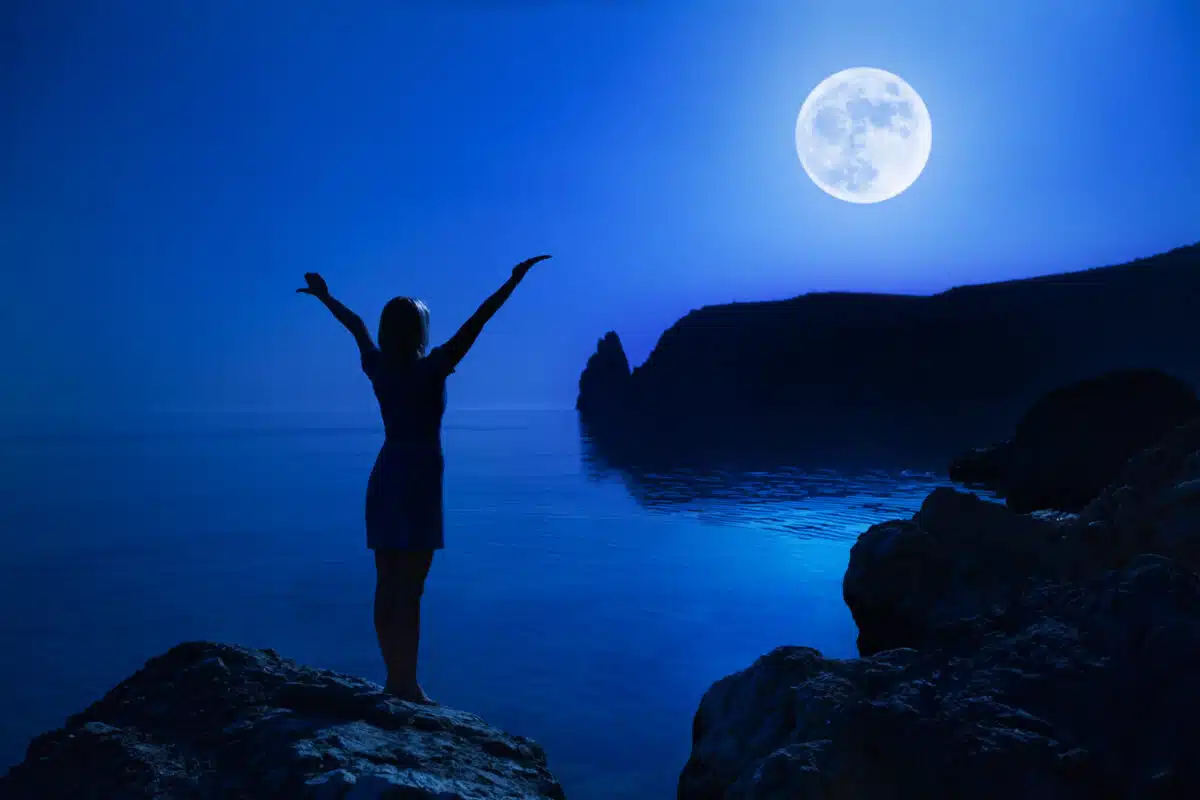
“Creation” by George William Russell
As one by one the veils took flight,
The day withdrew, the stars came up:
The spirit issued dark and bright,
Filling thy beauty like a cup.
Sacred thy laughter on the air,
Holy thy lightest word that fell,
Proud the innumerable hair
That waved at the enchanter’s spell.
Oh Master of the Beautiful,
Creating us from hour to hour,
Give me this vision to the full
To see in lightest things thy power!
This vision give, no heaven afar,
No throne, and yet I will rejoice,
Knowing beneath my feet a star,
Thy word in every wandering voice.
“Day” by George William Russell
In day from some titanic past it seems
As if a thread divine of memory runs;
Born ere the Mighty One began his dreams,
Or yet were stars and suns.
But here an iron will has fixed the bars;
Forgetfulness falls on earth’s myriad races:
No image of the proud and morning stars
Looks at us from their faces.
Yet yearning still to reach to those dim heights,
Each dream remembered is a burning-glass,
Where through to darkness from the Light of Lights
Its rays in splendour pass.
